RECENT DEVELOPMENTS IN TENNESSEE FIREARMS LAWS
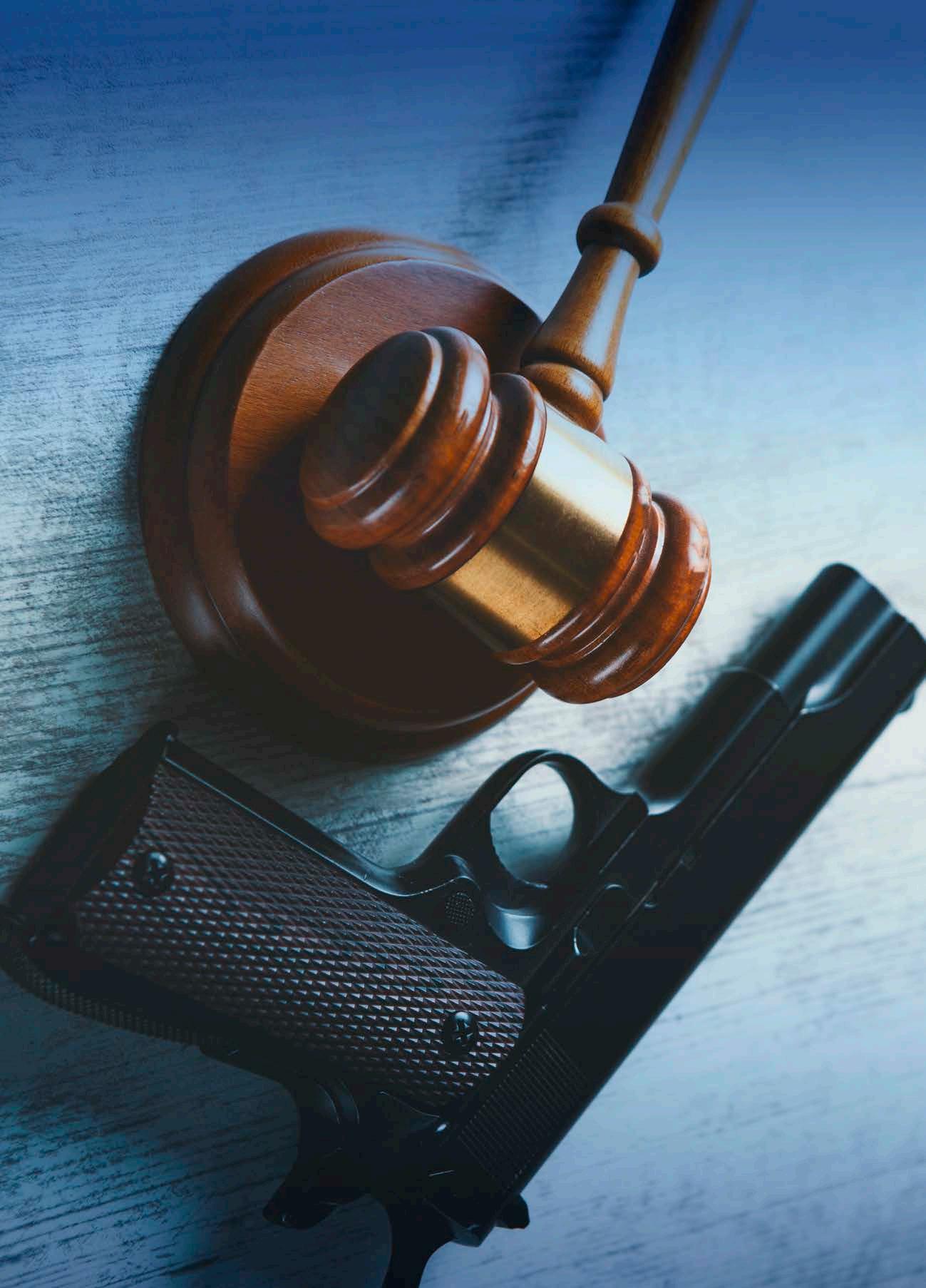
AI Update: What Do You Mean We’re Getting Sued—The Computer Hired Them . . . Page 14 Schooled in Ethics: New ABA Formal Ethics Opinion Discusses Constraints on Nonlawyer Assistants’ Intake Role . . . Page 20 A Monthly Publication of the Knoxville Bar Association | August 2023
Since 1993, our focus has been on preserving our clients’ financial assets, managing growth, and efficiently transferring wealth from one generation to another. We work closely with attorneys to ensure the coordination of our clients’ personal and financial goals.


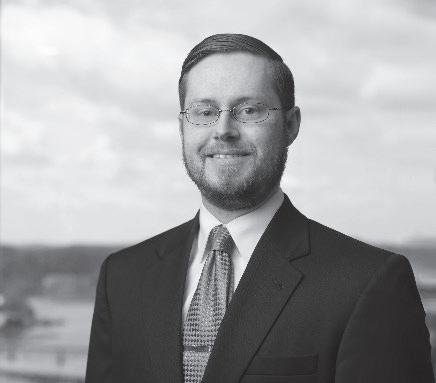

2 August 2023 DICTA IS PLEASED TO ANNOUNCE THAT DEVIN P. LYON HAS BEEN ADMITTED AS A PARTNER IN THE FIRM www.arnettbaker.com 170 Combined Years of Excellence In Knoxville contact: John L. Billings Vice President Client Administration 865.297.4070 A Tennessee-State Chartered Independent Fiduciary and Fee-Only Wealth Management Firm tcvwealth.com
STABILITY
Ursula Bailey
Meagan Collver
Daniel Ellis
Spencer Fair
Officers of the Knoxville Bar Association
KBA Board of Governors
Luke Ihnen

Hon. E. Jerome Melson
William A. Mynatt, Jr.
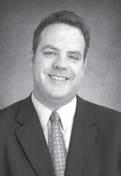
T. Mitchell Panter
Samantha Parris
CRITICAL
Courtney Epps Read Vanessa Samano
Charles S.J. Sharrett
Hon. Zachary Walden

Volume 51, Issue 7 Dicta
Dicta
DICTA is published monthly (except July) by the Knoxville Bar Association. It is designed to offer information of value to members of the local bar association. The news and features should illustrate the issues affecting the bar and its members. The opinions expressed do not necessarily represent those of the Knoxville Bar Association.
All articles submitted for publication in DICTA must be submitted in writing and in electronic format (via e-mail attachment). Exceptions to this policy must be cleared by KBA Executive Director Marsha Watson (522-6522).
Publications Committee
Executive Editor Cathy Shuck
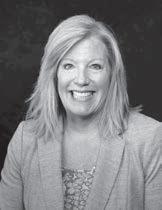
Executive Editor Sarah Booher
Executive Editor Melissa B. Carrasco
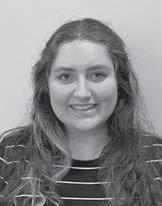

Brandon Allen
Anita D’Souza
Elizabeth B. Ford
Jennifer Franklyn
Joseph G. Jarret
F. Regina Koho
Matthew R. Lyon

Angelia Morie Nystrom
Katheryn Murray Ogle
Laura Reagan
Ann C. Short
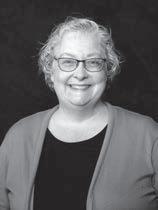
Eddy Smith
Grant Williamson
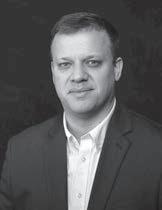
Managing Editor Marsha Watson KBA Executive Director


DICTA August 2023 3
the official
is
publication of the Knoxville Bar Association
The Knoxville Bar Association Staff
Marsha S. Watson Executive Director
Tracy Chain LRIS Administrator
Jason Galvas LRIS Assistant
505 Main Street Suite 50 Knoxville, TN 37902 865-522-6522 Fax: 865-523-5662 www.knoxbar.org
This Issue August 2023 16 Recent Developments in Tennessee Firearms Laws 5 President’s Message Best Educated Bar 7 Practice Tips Intro to Substantiating Charitable Contributions 14 AI Update What Do You Mean We’re Getting Sued—The Computer Hired Them 15 Legal Update The Major Questions Doctrine –No Minor Matter 20 Schooled in Ethics New ABA Formal Ethics Opinion Discusses Constraints on Nonlawyer Assistants’ Intake Role 25 Management Counsel Independent Contractor or Employee? NLRB Modifies its Test – Again 6 Well Read The Book of Charlie: Wisdom from the Remarkable American Life of a 109-Year-Old Man 9 Privileged To Be a Lawyer Riches Are More Than What One Has in a Bank Account 10 Legal Myth Breakers Playing The Shell Game: Blame It on The Rain 11 What I Learned About Inclusion and Why It Matters I Am Different 13 Hello My Name Is Oscar Butler 18 Simple Things Squeeze 19 In Limine: Profiling Future JDs Fajorah Poteau 23 Of Local Lore & Lawyers Great Plains Wisdom 24 Barrister Bites “You Made My Sous Vide Cry”: Adventures with Sous Vide Cooking 27 Legally Weird When AI Ain’t I: A Cautionary Tale 29 Bill & Phil Gadgets Summer Gadgets 31 Tell Me A Story An Ill-Defined Path to an Ideal Destination 4 Section Notices/Event Calendar 22 Barrister Bullets/New Members 22 Change of Addresses 28 Bench & Bar in the News 30 Pro Bono Project COVER STORY
Knoxville Bar Association
In
FOCUS WISDOM COMMON GROUND President
Loretta
G. Cravens President Elect Carlos A. Yunsan Treasurer Jonathan Cooper Secretary Rachel Park Hurt Immediate Past President Jason H. Long
Tammy Sharpe Director of CLE & Section Programming
Jonathan Guess Database Administrator Bridgette Fly Programs & Communications Coordinator
SECTION NOTICES & EVENT CALENDAR
Section Notices
There is no additional charge for membership in any section, but in order to participate, your membership in the KBA must be current. To have your name added to the section list, please contact the KBA office at 522-6522.
Alternative Dispute Resolution Section
The ADR Section plans regular CLE throughout the year. Save the date for the annual CLE program “Mediation: Practice & Ethics Update,” scheduled for December 19. If you have a CLE program topic or speaker suggestions, please contact the ADR Section Chairs Joe Jarrett (566-5393) or Betsy Meadows (540-8777).
Bankruptcy Law Section
The Bankruptcy Section plans CLE programs and helps coordinate volunteers for the Pro Bono Debt Relief Clinics. The next Pro Bono Debt Relief Clinic will be held on August 26, and volunteer registration is available at www.knoxbar.org. Join the Bankruptcy Law Section for the upcoming CLE program “Meet the ‘New’ Standing Chapter 13 Trustee, Debra L. Miller” on September 22, featuring Hon. Suzanne Bauknight and Debra Miller. In conjunction with the CLE, the “Annual Celebration of the Pro Bono Debt Relief Clinic” will also be held on September 22. The celebration and reception will be held from 2-3 p.m. on the Fourth Floor of the Howard H. Baker Jr. United States Courthouse. If you have a CLE program topic or speaker suggestions, please contact the Bankruptcy Section Chairs Tom Dickenson (292-2307) or Greg Logue (215-1000).
Corporate Counsel
The Corporate Counsel Section provides attorneys employed by a corporation or who limit their practice to direct representation of corporations with an opportunity to meet regularly and exchange ideas on issues of common concern. The annual 3-hour CLE program, “Corporate Ethics & Update,” is on August 23. If you would like to know how you can get involved or have suggestions for CLE topics, please contact Section Chairs David Headrick (363-9181) or Marcia Kilby (362-1391).
Criminal Justice
The KBA Criminal Justice Section represents all attorneys and judges who participate in the criminal justice system in Knox County. Join the Criminal Justice Section for the upcoming CLE “The Government is Sliding into Your DMs” on September 12. If you have suggestions for CLE topics, please contact Section Chairs Joshua Hedrick (524-8106) or Sarah Keith (931-260-5866).
Employment Law
The Employment Law Section is intended for management and plaintiffs’ counsel, in addition to in-house and government attorneys. If you have a program topic or speaker suggestions, please contact the Employment Law Section Chairs Howard Jackson (546-1000) or Tim Roberto (6912777).
Environmental Law
The Environmental Law Section provides a forum for lawyers from a variety of backgrounds, including government, corporate in-house, and private firm counsel. If you have suggestions for CLE topics, please contact Section Chairs Catherine Anglin (525-0880), Kendra Mansur (771-7192), or Jimmy Wright (637-3531).
Family Law Section
The Family Law Section has speakers on family law topics or provides the opportunity to discuss issues relevant to family law practice. Save the date for the annual CLE program “TN Family Law Update” scheduled for December 5. If you are interested in getting involved or have suggestions for CLE topics, contact Section Chairs Jo Ann Lehberger (539-3515) or Steve Sharp (971-4040).
Government & Public Service Lawyers Section
The Government & Public Service Lawyers Section is open to all lawyers employed by any governmental entity, state, federal, or local, including judicial clerks and attorneys with legal service agencies. If you are interested in getting involved or have suggestions for CLE topics, contact Hon. Suzanne Bauknight (545-4284) or Ron Mills (215-2050).
Juvenile Court & Child Justice Section
The Juvenile Court & Child Justice Section has speakers on juvenile law topics or provides the opportunity to discuss issues relevant to juvenile law practice. If you have suggestions for CLE topics, please contact Section Chairs Justin Pruitt (215-6440) or Mike Stanuszek (766-4170).
New Lawyers Section
The New Lawyers Section is for attorneys within their first three years of practice, and any KBA member licensed since 2021 will automatically be opted-in to the section. If you would like to get involved in planning Section activities, please contact Section Chairs Kathryn Haaquist (525-0880) or Nicole Turbinton (221-7542).
Senior Section
The KBA Senior Section will meet next on Tuesday, August 29, at Calhoun’s on Bearden Hill. “The 2023 Volunteers: A Football Preview” will feature Bob Kesling, Director of Broadcasting and Voice of the Vols. The buffet luncheon will be held from 11:30 a.m. to 1:00 p.m. If you have suggestions for luncheon speakers, please contact Chair Wayne Kline at (292-2307) or Sam Rutherford (659-3833).
Solo Practitioner & Small Firm Section
The goal of the Solo Practitioner & Small Firm Section is to provide and encourage networking opportunities and offer high quality CLE programs featuring topics that will help solo/small firm attorneys enhance and improve their practices and assist them with law office management challenges. If you have a program topic or speaker suggestions, please contact Section Chairs Tim Grandchamp (392-5936) or Brittany Dykes (214-7869).
4 August 2023 DICTA
Check the KBA Events Calendar at www.knoxbar.org for scheduling updates. August 1 Law Office Tech Committee 4 Diversity in the Profession Committee 8 Professionalism Committee 9 Barristers Meeting 9 Veterans Legal Advice Clinic 9 Wellness Committee 10 Judicial Committee 15 Workers Comp Update CLE 17 IP Law Update CLE 17 New Lawyers Section – Discovery Law CLE 18 Tennis & Pickleball Tournament 23 Corporate Counsel Ethics Update CLE 23 Board of Governors Meeting 24 Justice Lee’s Portrait Unveiling 29 Senior Section Luncheon September 1 Diversity in the Profession Committee 5 Law Office Tech Committee 5 Justice Tarwater’s Investiture 6 Bench & Bar Celebration 12 Criminal Law Section CLE 12 Professionalism Committee 12 Access to Justice Committee 13 Wellness Committee 13 Veterans Legal Advice Clinic 13 Barristers Meeting 14 Judicial Committee 15 Wellness Conference 15 Barristers Constitution Day 22 Barristers Constitution Day 22 Bankruptcy CLE & Reception 22 Family Law Section Social 26 CLE Committee 27 Board of Governors Meeting n n n n n n n n n n n n n n n n n n n n n n n n n n n n n n n n n SAVE THE DATE: Wellness Conference & Health Fair September 15
event calendar
PRESIDENT’S MESSAGE
By: Loretta G. Cravens Eldridge & Blakney, P.C.
BEST EDUCATED BAR
The KBA has long prided itself on striving to be the best educated bar in Tennessee. Our CLE and other committees work toward that goal on a constant basis. Being the best educated bar, however, requires more than just well-planned, thoughtful, insightful, and educational CLE programming. It also requires a component of self-education and educating others about our legal community. In service of that goal, the KBA is again conducting the Economics and Law Office Management survey (watch your inbox for the link to complete it). The survey is conducted every other year. It covers a variety of topics related to the economics of law office management and the operations of law offices and firms in our member area. The results will be published for member use. How do your office demographics, salary, and practices match up to the prevailing norms in Knoxville? Does your office need to implement changes to remain competitive in attracting and retaining the best talent? What is really important to lawyers in considering a multitude of aspects of the practice of law? The Economics and Law Office Management survey results will educate you. The 2023 survey will also include the results of the two preceding surveys conducted in 2019 and 2021 to better illustrate current trends.
Other bar associations our size and larger conduct similar surveys and it is a valuable resource that the KBA can provide to its membership with only a few minutes of your time (side note: law students and new lawyers coming to our community crave this information). Your participation and responses remain completely anonymous. Survey results are collected and compiled on behalf of the KBA by the ABA Division of Bar Services, and they do not provide any identifying information to the KBA about the survey participants, with one limited exception. Those who complete the survey will be entered into a drawing for a couple of $250 Amazon Gift Cards. The drawing is also conducted by the ABA, so all the KBA will ever know about survey participants identities, is that the winner of the gift card participated. Just think of spending that free money! Please take a few minutes to complete the survey and contribute in this way to the continued evolution of our best educated bar.
On the topic of Best Bar, I digress to add a love letter to our bar. As I write this, and perhaps when you read it, I am in trial in another state, a lengthy trial that began in early June. So, if you haven’t seen me around in a while, you now know why. While challenging, it has given me an opportunity to reflect on the truly special bar that we have in Knoxville. I WISH I were here! We undoubtedly have the most collegial, respectful, and knowledgeable judges and lawyers anywhere right here in Knoxville. I am so grateful that my practice’s home base is here. I have tried hard cases before. I have tried long cases before. I long for my next trial to be right here in the KBA service area. So, let me just say thank you. Thank you to every lawyer I have ever worked with, every opposing counsel, every member of the judiciary that has presided over any matter I have ever been involved with or witnessed in my career, every colleague I have
come to know in our community or in service to the Bar. You are truly special individuals in service of a great cause, and you do so with grace and respect. You should be applauded for that, and I leave you with a shorter than usual President’s message and my heartfelt gratitude. I look forward to reconnecting with you as soon as possible.
AN OPPORTUNITY TO
CELEBRATE OUR BENCH & BAR: I hope you will join us for a unique opportunity to show true fellowship in celebration of what we do. The KBA’s Bench & Bar Celebration will be held on Wednesday, September 6, 2023, from 6-8 pm at the Clinch Concourse at the Knoxville Convention. The Supreme Court and our local judges are invited guests, and thanks to our generous sponsors, cocktails and hors d’oeuvres will be plentiful. This is a cocktail reception where the only purpose is celebration, fellowship, and appreciation. Take advantage of the opportunity and come join us.
Litigation Support


Digital Forensics

Forensic Accounting
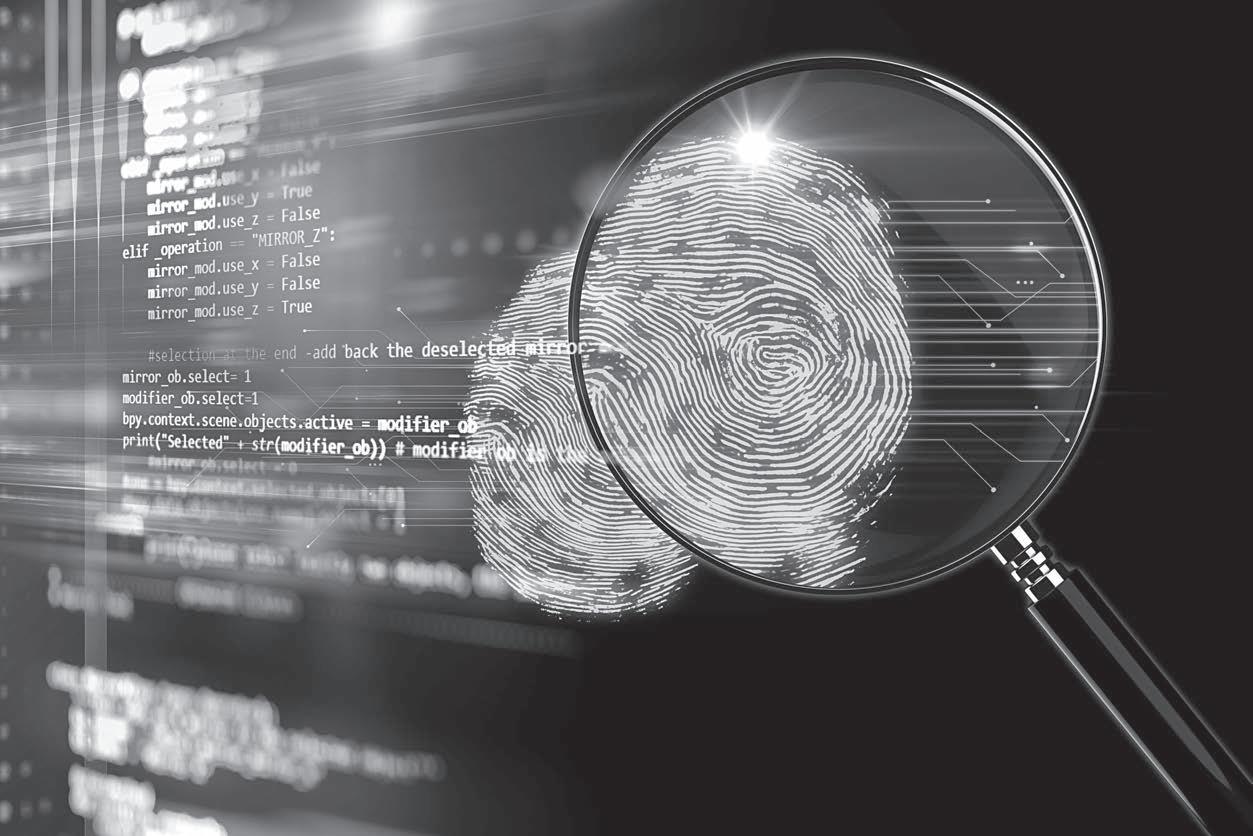
DICTA August 2023 5
WWW.LBMC.COM/ADVISORY
with you for:
Electronic Discovery Our nationally recognized team of experts partner
WELL READ
By: Cheryl G. Rice Egerton, McAfee, Armistead & Davis, P.C.

THE BOOK OF CHARLIE: WISDOM FROM THE REMARKABLE AMERICAN LIFE OF A 109-YEAR-OLD MAN

Washington Post opinion editor and noted author David Von Drehle started with a plan to write a book for his children. After years of reading to them at bedtime, they had outgrown the evening ritual. But they had matured enough to realize Von Drehle wrote for a living and asked him to write something for them. Given the radical changes in technology and society his children were likely to experience in their lives, he decided his three would benefit from a guide to “unlocking the secrets of life inside the storm.” And he found the perfect example in their neighbor, Charlie White. If you are looking for an easy summer read, to learn a little about American life in the early 20th Century, or to gain a few grains of wisdom that you may apply to the curve balls that life or the practice of law can throw at you, I recommend this book.
As Von Drehle describes, a few days after he and his wife moved their young family from Washington, DC to Kansas City, Missouri in 2007, he stepped out his front door one Sunday morning to grab the newspaper. Looking across the street in the already sweltering August heat, he saw his neighbor Charlie White, wearing only swim trunks, washing his girlfriend’s purple car. Muscular and debonair, Charlie looked over at Von Drehle and waived, sponge in hand, with a smile. Thus began a friendship that lasted the next seven years. Charlie was 102.
Charlie White was fun, funny, engaging, and engaged. Over the years of their friendship, Von Drehle and Charlie spent many visits discussing current events, their families, the events of Charlie’s life, and everything in between. In The Book of Charlie, Von Drehle describes his inspiring neighbor whose life spanned more than a century. Charlie was a man who beat the odds several times and lived to tell it, humbly, to his younger friend. He experienced great tragedy, more than once, and yet exuded joie de vivre that was the envy of most (myself included). A true American success story, Charlie White experienced profound loss as a child, displayed unusual pluck and grit, and made himself into someone who would make his parents, and others around him, proud. His mother’s words were his guiding mantra to the day of his death. She told him, “Just do the right thing.” And by those words, with determination and ingenuity, he lived a fascinating life that began before the radio was invented and outlived the advent of television, computers, space travel, and the smartphone.
Charlie, born in 1905 as the only son in a family of five children, became the “man of the house” at an early age. He finished high school
at sixteen in a time when only three in ten Americans attended high school. He taught himself the saxophone and worked his way through college and later medical school, playing sorority teas in the afternoons and school dances on weekends. He traveled this country before the interstate highway system existed and became a family doctor before penicillin was discovered. Yet, he embraced the changes in his life and the world around him as they occurred. He found ways to adapt with the times and succeed. By his can-do attitude, Charlie developed a successful general medical practice during the Depression and later, as medicine evolved into a profession of specialists, became one of the most prominent anesthesiologists in the Midwest. In the same way, he overcame the loss of his first wife, an alcoholic who committed suicide, to marry a pilot and later wed a glamorous woman who became the true love of his life, building a family and sticking by her side for the next forty-plus years. He collected cars, bought farms, raised horses, served in medical missions, and more. He loved his profession, practicing medicine into his nineties and attending weekly grand rounds at the hospital even longer. Charlie not only did it all, but he did also it with uncommon style and looked back on it as a grand adventure.
How did he do that? As Von Drehle explains, “Charlie made an art of living. He understood, as great artists do, that every life is a mixture of comedy and tragedy, joy and sorrow, daring and fear.” He faced life with stoicism and resilience. Whether intentionally or perhaps subconsciously, he looked for the silver lining in every cloud, seizing opportunities whenever they presented themselves and focusing on the things that mattered. Amazingly, he seemed able to let everything else go. When I say that, I don’t mean that Charlie was insensitive or unfeeling. Only that he consciously chose not to dwell in the past. Charlie permitted himself to do his best, make mistakes, learn from them, and move on.
After reaching the age of 100, on being asked what his philosophy of life was, Charlie responded, “Do the right thing” and added, “This will pass.” Regardless of what you’re facing,” he said, “You’ve got to work through it and hold the line, and don’t fall apart. Stick in there. There’s no future in negativism.” Charlie’s life was true to this philosophy. The many examples in Von Drehle’s book provide examples we can apply to our own struggles. Charlie’s story and his simple truths for life, including:
Work hard
Spread joy
Take a chance
Enjoy wonder are reminders to us all to pursue our passions, be kind to others and to ourselves, and live each day as the gift that it is.
In writing a book for his kids, David Von Drehle has penned a tale that we can enjoy containing lessons to carry with us. I hope you’ll make a few minutes to read this book. If you do, I hope you find Charlie White’s 109-year saga to be as entertaining and as illuminating as I did. Happy reading!
6 August 2023 DICTA
PRACTICE TIPS
By: Sarah M. Thornsberry Gentry, Tipton & McLemore, P.C.

INTRO TO SUBSTANTIATING CHARITABLE CONTRIBUTIONS
In the past year, the U.S. Tax Court case, Schweizer v. Commissioner, 124 T.C.M. 232 (T.C. 2022) was a popular mention in various tax law newsletters. The case addressed the situation in which an arts collector was denied a charitable contribution income tax deduction for a donation of art to a museum. The reason? Lack of proper substantiation of the charitable gift.
For exempt organizations and charitably minded individuals alike, the substantiation of charitable contributions can be a trap for the unwary. It is our job as attorneys to guide our clients through the detailed and varied charitable contribution deduction rules.
Charitable Contribution Income Tax Deductions
A “charitable contribution” is defined as a contribution or gift to or for the use of specific categories of exempt organizations, including an organization qualifying under I.R.C. Section 501(c)(3)1 and established for religious, charitable, scientific, literary, or educational purposes, to foster national or international amateur sports competition (but only if no part of its activities involve the provision of athletic facilities or equipment), or for the prevention of cruelty to children or animals.2
The amount of charitable contributions that an individual taxpayer may deduct for federal income tax purposes in any given tax year is based on a range from thirty percent (30%) of adjusted gross income to sixty percent (60%) of adjusted gross income. The correct percentage limitation depends on (i) the category of exempt organization receiving the charitable contribution;3 and (ii) the type of property contributed.4 Amounts that cannot be currently deducted due to the applicable limitations can generally be carried forward and deducted in the five succeeding tax years.5
However, no charitable contribution federal income tax deduction shall be permitted for any charitable contribution of $250 or more unless the contribution is properly substantiated. Substantiation Requirements.
Any charitable contribution of $250 or more (whether cash or other property) requires a contemporaneous written acknowledgment of the contribution provided by the donee exempt organization to the contributing taxpayer.6
A Contemporaneous Written Acknowledgement (“CWA”) must include the following:
Clause One: The amount of cash or a description (but not value) of any property other than cash that is contributed; and
Clause Two: A statement as to whether the donee exempt organization provided any goods or services in consideration, in whole or in part, for the contributed property described in Clause One. If Clause Two is affirmative, it must also include a description and good faith estimate of the value of any goods or services provided by the donee exempt organization to the taxpayer in consideration of the gift.
A Written Acknowledgement is “Contemporaneous” if the taxpayer receives the written acknowledgement from the exempt organization on or before the earlier of: (i) the date on which the taxpayer files a federal income tax return for the year in which the charitable contribution was made; or (ii) the due date (including extended due dates) for filing such return.7
An additional third clause is required to be included in the CWA if a charitable contribution is made to a donor advised fund with respect to a qualifying sponsoring organization.8 The third clause should state that such sponsoring organization “has exclusive legal control over the assets
contributed.”9
The CWA is the bare minimum for charitable contributions valuing $250 or more. Further substantiation is required if the value of donated property exceeds certain thresholds. For example:
1. Contributions of $500 or more.
a. W hen cash or other property is contributed with a value of $500 or more, the taxpayer must also include a description of such property with the taxpayer’s federal income tax return for the taxable year in which the contribution is made.10
2. Contributions of $5,000 or more
a. W hen property other than cash is contributed with a value of $5,000 or more, the taxpayer must also obtain a qualified appraisal of such property and attach such appraisal to the taxpayer’s federal income tax return for the taxable year in which the contribution is made.11 The substantiation requirements build upon one another and become further complicated with types of contributed property – such as future interests, qualified conservation contributions, or capital gain property. Proper substantiation of charitable contributions is low hanging fruit for the IRS to flag and pursue. It allows the IRS to disallow charitable contribution deductions in full based on a taxpayer’s failure to totally adhere to technical requirements.
Even claiming substantial compliance of the strict requirements of the Contemporaneous Written Acknowledgement is not a viable argument for a taxpayer.12 As the saying goes, the devil is in the details when following the charitable contribution statutory and regulatory guidance to ensure that the correct information is (i) exchanged between the donee exempt organization and the contributing taxpayer, and (ii) provided to the Internal Revenue Service.
1 This category includes (but is not limited to) churches, exempt private schools, exempt hospitals, and publicly supported charities and private foundations. See I.R.C. §§ 501(c)(3), 509, and 170(b)(1)(A) (Bloomberg).
2 A “charitable contribution” may also be made to the following categories: (i) the United States, a State, or any political subdivision of the foregoing, if the gift is made exclusively for public purposes; (ii) organizations of war veterans or related groups organized in the United States; (iii) domestic fraternal societies operating under the lodge system if the contribution is used exclusively for charitable purposes; and (iv) cemetery companies owned exclusively for the benefit of members and certain exempt cemetery corporations. I.R.C. § 170(c) (Bloomberg).
3 I.R.C. § 170(b)(1)(A) (Bloomberg). The IRS Tax Exempt Organization Search Tool is a helpful resource. The search platform includes an exempt organization’s eligibility to receive tax-deductible charitable contributions.
4 See I.R.C. § 170(b) (Bloomberg).
5 I.R.C. § 170(d) (Bloomberg). Each succeeding taxable year, the deduction amount is subject to the same percentage limitations.
6 I.R.C. § 170(f)(8) (Bloomberg).
7 I.R.C. § 170(f)(8)(C) (Bloomberg) (emphasis added).
8 For definition of “qualifying sponsor organization” see I.R.C. § 170(f)(18)(A) (Bloomberg).
9 I.R.C. § 170(f)(18)(B) (Bloomberg). Note that the CWA substantive requirements change when there is a charitable contribution of used motor vehicles, boats, or airplanes. I.R.C. § 170(f)(12)(A)(i) (Bloomberg). See also Izen v. Comm’r, 38 F.4th 459 (5th Cir. 2022) where the taxpayer’s name and tax identification number were not provided on the CWA or additional tax form describing the gift of the taxpayer’s interest in an airplane. The court found inadequate substantiation and denied the taxpayer his charitable contribution deduction.
10 I.R.C. § 170(f)(11)(B); Treas. Reg. § 1.170A-13(b)(3) (Bloomberg).
11 I.R.C. § 170(f)(11)(C) (Bloomberg).
12 Albrecht v. Comm’r, T.C. Memo 2022-53 (citing 15 W. 17th St. LLC v. Comm’r, 157 T.C. at 562 (T.C. 2016) and Addis v. Comm’r, 374 F.3d 881, 887 (9th Cir. 2004)).
DICTA August 2023 7

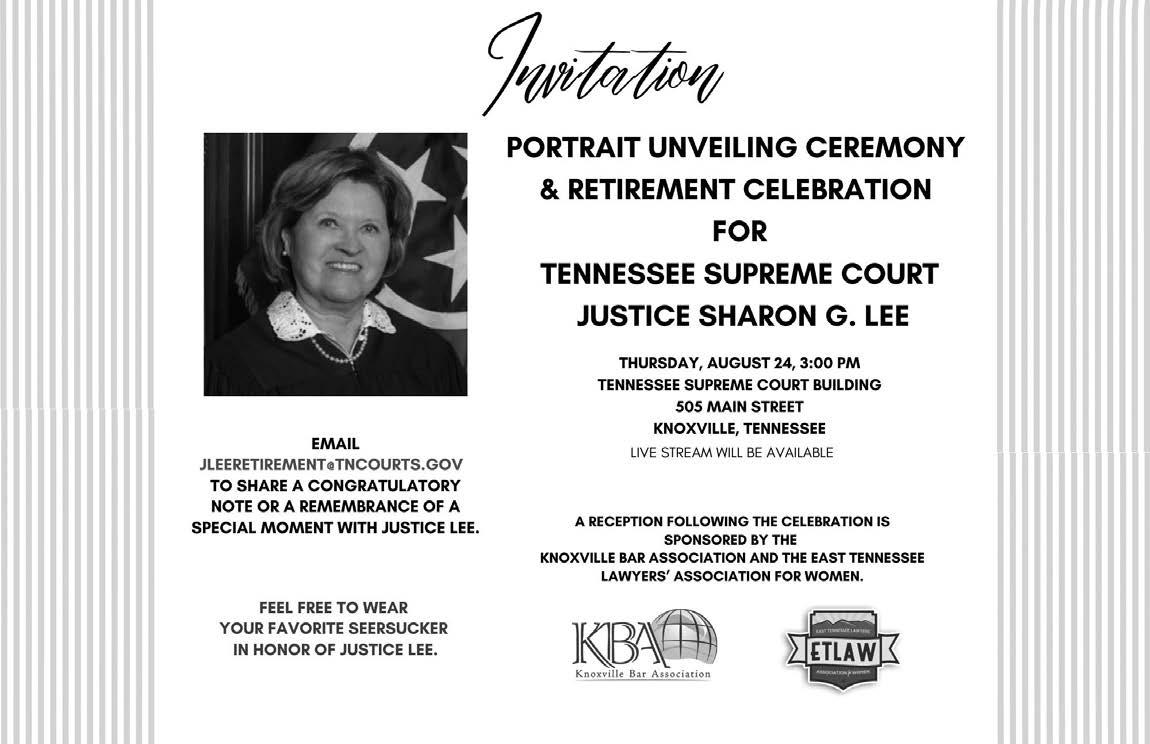
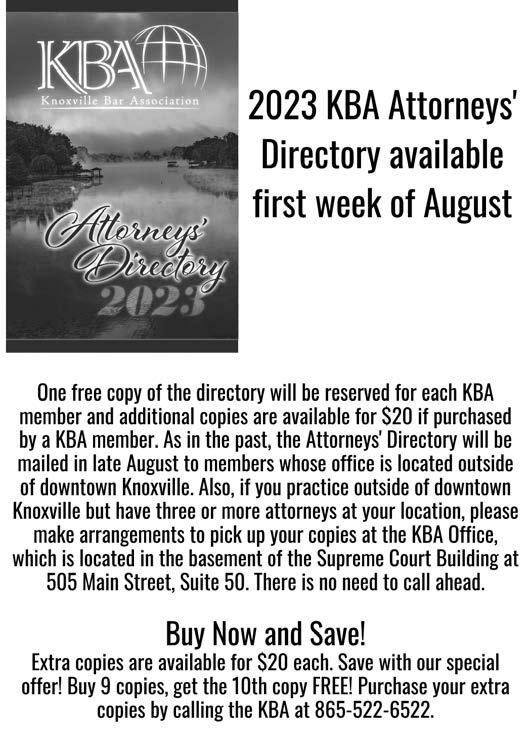
8 August 2023 DICTA WATSON, ROACH, BATSON & LAUDERBACK, P.L.C. IS PLEASED TO ANNOUNCE THAT CLIFF ROBINS HAS BECOME AN ASSOCIATE WITH THE FIRM 1500 RIVERVIEW TOWER 900 SOUTH GAY STREET POST OFFICE BOX 131 KNOXVILLE, TENNESSEE 37901-0131 865.637.1700 865.525.2514 (FAX) www.watsonroach.com
PRIVILEGED TO BE A LAWYER
By: Jack H. (Nick) McCall
RICHES ARE MORE THAN WHAT ONE HAS IN A BANK ACCOUNT
When I began practicing law thirty-two years ago, one of the “must-read” books in legal circles was Sol Linowitz’s The Betrayed Profession.1 In searching prose, this book chronicled many reasons why the American public held the legal profession in low esteem. As a “baby lawyer” listening to Mr. Linowitz’s Law Day lecture in Nashville, I recall thinking: “Wow; have I entered a troubled profession?” Thirty years later, many of these same issues sadly remain true.
One personal, then-and-now, difference for me is this: I’ve had the blessings of over thirty years of legal experience to take a fuller measure of the profession and its hard spots and hurdles, as well as its blessings. Today, I want to focus on those blessings, or at least as I have lived them. We all get plenty of news and updates on the downsides.
I was the first in my family to graduate from college. I was also the first to graduate from law school. Although my father, an old Middle Tennessee farm boy, called me a “pettifogger” (that shows you much of his personal feelings about lawyers!), he also thought himself lucky now to have one in the family. I aimed to make my parents proud. Their thoughts on what would be best for me would be to practice with a Nashville law firm law for the rest of my life.
I accepted a Nashville firm’s offer to join its litigation team. Just weeks before my judicial clerkship with the U.S. Sixth Circuit, ended, several partners told me of a change in plans: how did I feel about being a corporate/securities and franchising lawyer instead of a litigator?
To become a transactional lawyer was not what I had in mind at law school. Well, I accepted their proposal. Although the firm broke up less than two years after I joined, I’ve remained a transactional lawyer throughout my career. I ended up being grateful for that.
The law firm’s breakup put me on a direct trajectory to Knoxville. Although interviewing with other Middle Tennessee, Washington, D.C. and Atlanta firms, my dear wife, Jennifer, a Knoxville girl, urged me not to neglect Knoxville opportunities. At the time, Richmond-based Hunton & Williams had a Knoxville office. Although I hoped to realign myself into litigation, one of Hunton’s partners had a crucial need for anyone with a basic knowledge of federal securities laws; experience in forming and financing corporations, partnerships and LLCs; and contracts drafting. “I could do that,” I thought.
My work at H&W was very fast-paced! I mastered a unique kind of business entity, real estate investment trusts (“REITs”) and their highlynuanced securities and tax rules. Many REIT clients were Memphis apartment and hospitality companies. (Some months, I spent almost as much time there, or in Atlanta and New York, as I did in Knoxville.)
I talked one evening with Keith Burroughs, Steve Collins and Dave Eldridge about our respective weeks; I understood exactly the kinds of motions or briefs they had worked on. My SEC (the “other” SEC) filings and proxy statement-filled week caused Dave to exclaim: “Nick, you sound like some kind of weird investment banker!” He was not wrong.
Hunton even sent me to Warsaw, Poland for most of November 1997 and to Houston for most of 2001. I thought, I wouldn’t have had these experiences if I had stayed in Nashville
About nine years later, I left Hunton to join the brand-new law department of a Knoxville corporation. CTI Molecular Imaging was acquired by Siemens Healthcare (now Siemens Healthineers) three years later. I never thought that I would be the general counsel of a NASDAQlisted, high-tech medical company with many overseas subsidiaries.
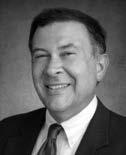
After CTI, I joined Tennessee Valley Authority. I served TVA as a commercial lawyer focused on federal procurement contracts and a secondary—but equally challenging and fascinating—duty as an agency ethics official. The near-fifteen years I spent at TVA were among the most rewarding of my life. I cherish my TVA friends and clients.
Many of our fellow citizens have incomplete or flawed views of the nature of federal agency work. I can honestly say that TVA was as tough, demanding and, at times, midnight-oil-burning legal work as any I have personally experienced. Yet, it was also highly rewarding: one can work on projects directly affecting the lives of over eight million people across seven states. One sees the tangible fruits of one’s legal labors in things like the dedication of a new solar farm, or the rebuilding of a dam. That immediacy, that sense of gratification, is priceless.
Law practice can be, and often is, so demanding. (I certainly appreciate the truths of that old chestnut, “The law is a jealous mistress.”) Still, I can honestly say: law has given me everything. It gave me my wife (Jennie was a UT law school classmate); it gave me many of my very best friends; it gave me clients who I still talk and laugh with, years later. It gave me more brain-teasers than any law professor could ever dream up. It gave me far more than a paycheck.
It also gave me a new home. After working in other states and cities, I remain convinced that the practice of law in Knoxville is far more collegial than in so many other locations. And, when someone asks me, “Where’s your home?”, without even thinking, I’ve realized that my answer has changed from “I’m from Franklin” to “I’m a Knoxvillian.” I thank the law for that, too.
During a summer clerkship with a Nashville firm, one of its partners said: “You’ll never get rich.” Ah, but I have. Riches are more than what one has in a bank account. I consider myself a very fortunate person, and one who does not regret—despite those days when I gritted and ground my teeth!—my decision in joining the legal profession.
Law can still make a difference in our citizens’ lives. It certainly made a difference in my and my family’s own lives.
DICTA August 2023 9
1 Sol M. Linowitz, with Martin Mayer, The Betrayed Profession: Lawyering at the End of the Twentieth Century (New York: Charles Scribner’s Sons, 1994).
LEGAL MYTH BREAKERS
By: Brad Fraser
Leitner Williams Dooley Napolitan, PLLC Stefanie Bowen
 Leitner Williams Dooley Napolitan, PLLC
Leitner Williams Dooley Napolitan, PLLC

PLAYING THE SHELL GAME: BLAME IT ON THE RAIN
Much like the “shell games” that take place on numerous street corners throughout the world, sometimes vetting, selecting, and disclosing expert witnesses seems like a game. The winning strategy seems to be keeping a close eye on all moving parts. If you look hard enough, you may be able to sniff out the imposters.
In 1989 the German-French R&B Duo known as Milli Vanilli saw international success and critical acclaim, releasing the certified-sixtimes-platinum album Girl You Know It’s True with three number one singles.1 But the group, comprised of Rob Pilatus and Fabrice Moran, saw fame quickly turn to infamy, despite winning a Grammy Award for Best New Artist in 1990, when it was revealed that the pair did not actually record the vocals for the album nor perform them live.2 Instead, four uncredited singers recorded hits like Blame it on the Rain and Baby Don’t Forget My Number while Rob and Fab were credited in album notes and appeared in public.3 Following the scandal, the pair returned the Grammy award and, alongside record companies and producers, faced consumer fraud protection law suits.4 You cannot always believe everything you see.
Many purported “experts” have similar flaws and employ similar methodology. Expert witnesses bring scientific, technical, or other specialized knowledge to the trier of fact in order to assist in understanding evidence or determine a fact at issue.5 Under Federal Rule of Civil Procedure 26(a)(2)(B), expert testimony must be “accompanied by an expert report, prepared and signed by the witness.” (emphasis added). The Rule does not prohibit counsel from assisting in preparing the report, but how far is too far?
Whether a report comports with the requirements of Rule 26 usually turns on whether counsel’s participation “so exceeds the bounds of legitimate assistance as to negate the possibility that the expert actually prepared his own report, i.e., the expert must substantially participate in the preparation of his or her report.”6 On the one hand, an expert must participate beyond merely reviewing counsel’s draft and signing in agreement. Still, the Advisory Committee Notes for Rule 26 contemplate some assistance from counsel.7 Because the requirements of the report are “exacting” and experts are likely “preoccupied” with their own field of expertise, it is expected that counsel will assist with the “fine-tuning of an expert report in order to ensure compliance with the rule is permissible.”8 But these examples are, obviously, two extremes— completely writing an expert’s report or providing limited guidance to comport with required rules. Other murkier scenarios exist in expert report preparation.
In Bekaert Corp. v. City of Dyersburg, the Western District of Tennessee struck an expert’s testimony when counsel’s assistance so exceeded permissible bounds that it negated the possibility the expert prepared his own report.9 When questioned, the expert stated he participated in the preparation of the report, and that the report was a “collaborative effort.”10 But the expert failed to identify which portions, specifically, he prepared.11 The Court held that the assistance, much akin to full preparation of a report with the expert’s signature following, negated the possibility he prepared his own report, and the expert’s testimony was excluded.12
Preparation, however, may not mean “writing.” An expert need not write or type his own report, at least in the Sixth Circuit, so long as the report is comprised of his or her actual views.13 In United States v. Kalymon, several experts testified that they told Government counsel their substantive opinions, and then counsel reduced those opinions to writing for the experts’ review and signature.14 The Court held that this was appropriate, and the District Court did not abuse its discretion by including the experts’ testimony.15 They cited the Rule, stating the report must reflect the expert’s opinion and be signed by the witness.16 The act of counsel reducing an expert’s opinion to writing is, at least in the Sixth Circuit, not enough to negate the possibility that the expert participated in the report’s preparation.
Amendments to Federal Rule of Civil Procedure 26 in 2010 altered expert disclosure requirements and limited expert discovery, citing problems of discovery due to overly broad interpretations.17 Previous interpretations of Rule 26 permitted discovery of just about any information considered in forming an opinion, including attorney-expert communications and drafts of expert reports.18 While the purpose of these amendments was to address the guarded attitude between attorneys and experts that led to increased expenses and impeded effective communication, the outcome has reduced opportunities to examine the degree to which an expert participated in the preparation of his or her report.19 Challenging an expert’s report under Rule 26 is more difficult with fewer opportunities to investigate and understand what is the actual opinion of an expert. Keeping an eye on the moving parts becomes more difficult, absent some of the moving parts.
As Milli Vanilli’s producer learned, it’s best to begin with a performer you are confident will produce results without sleight of hand. So, while a lawyer may offer expert advice to ensure compliance with Rule 26, make sure you know it’s true. Choose an expert with whom you are confident that he/she has the scientific, technical, or specialization to perform on his or her own.
1 BillBoard, Blame It on The Tape: A Behind-the-Scenes Oral History of the Rise and Fall of Milli Vanilli available at https://www.billboard.com/music/pop/milli-vanillioral-history-lip-syncing-8551402/ (last accessed July 1, 2023).
2 Id.
3 Id.
4 Id.
5 Fed. R. Evid. 702.
6 Bekaert Corp. v. City of Dyersburg, 256 F.R.D. 573, 578 (W.D. Tenn. 2009) quoting Advisory Committee Note for Fed. R. Civ. P. 26.
7 Id.
8 Id.
9 Id. at 579.
10 Id.
11 Id.
12 Id. at 579-80.
13 541 F.3d 624, 637 (6th Cir. 2008).
14 Id. at 637.
15 Id. at 638.
16 Id.
17 2010 Advisory Committee Note for Fed. R. Civ. P. 26.
18 Id.
19 Id.
10 August 2023 DICTA
I LEARNED ABOUT INCLUSION AND WHY IT MATTERS
 By: Whitney Trujillo Knox County Public Defender’s Community Law Office
By: Whitney Trujillo Knox County Public Defender’s Community Law Office
I AM DIFFERENT
I am different. I am a queer, non-binary attorney. I do not fit the traditional mold.
I began law school in 2015. I made the decision that summer to present myself how I felt most confident i.e., a faded haircut, suit, suspenders, and a flashy tie. I felt like a million bucks on that first day and, surprisingly, I maintained that confidence throughout my first year. It was the first time I felt accepted for being my authentic self; however, law school is a bubble. I forgot a world existed that did not seek to celebrate differences.

The end of my first year and much of my second involved applying for internships and clerkships. My first interview with a firm came with the normal anxiety, but I was ready. I wore my best suit and favorite floral print tie. I walked into the lobby, and the secretary greeted me with, “Can I help you?”
I stated I was here for an interview. She looked me over and asked, “Whitney?” I nodded. She told me to take a seat. I was called into the partner’s office, and all this partner said was, “I thought you were a man. You should have worn a skirt, or something, with that short hair.” I would like to tell you that I had the wherewithal to walk out. I would like to tell you that I engaged in a productive discourse. I would like to tell you that I did anything other than look at this person and say, “I’ll think about
that,” and proceed to dance the dance of trying to get a job.


It was humiliating. It shattered every ounce of confidence I had. It affected me well into the beginnings of my practice. I accepted that “different” would get me nowhere. I exchanged ties for more feminine work blouses and pant suits. It felt wrong, but people did not stare. People rarely made comments. I could go unnoticed. I had fallen right into the machinations of an institution bent on traditionalism.
The legal field has a way of making those who do not fit the mold feel small. It has an instinctive way of pushing those in the margins into the dark corners. It may not be from outright maliciousness. But, it is still felt in those small moments. The glances at your hair, the lingering looks at your makeup (or lack thereof), or the hushed conversations about how certain clothing or hairstyles are not professional.
I may be the author, but this story belongs to all those among us who feel they do not belong solely because of other’s worldviews. It is well overdue for the legal profession to confront its own implicit biases and recognize that the definition of professionalism has evolved. It does not matter what a person wears or how a person looks. Their objections will still stand. Their arguments will still be heard.
(I’m back to my floral ties, if you were wondering.)
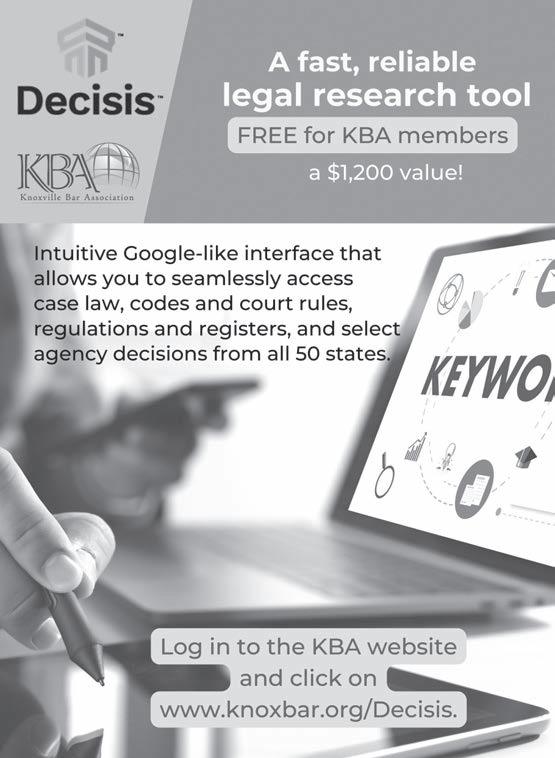
DICTA August 2023 11
WHAT
Experience the Easiest and Most Powerful Legal Time & Billing Software Book Your Demo Today | rocketmatter.com/demo | 866-710-1845


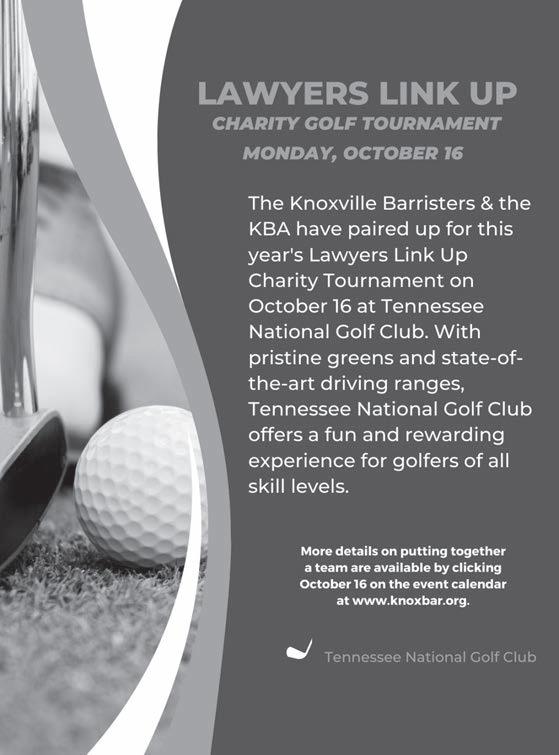
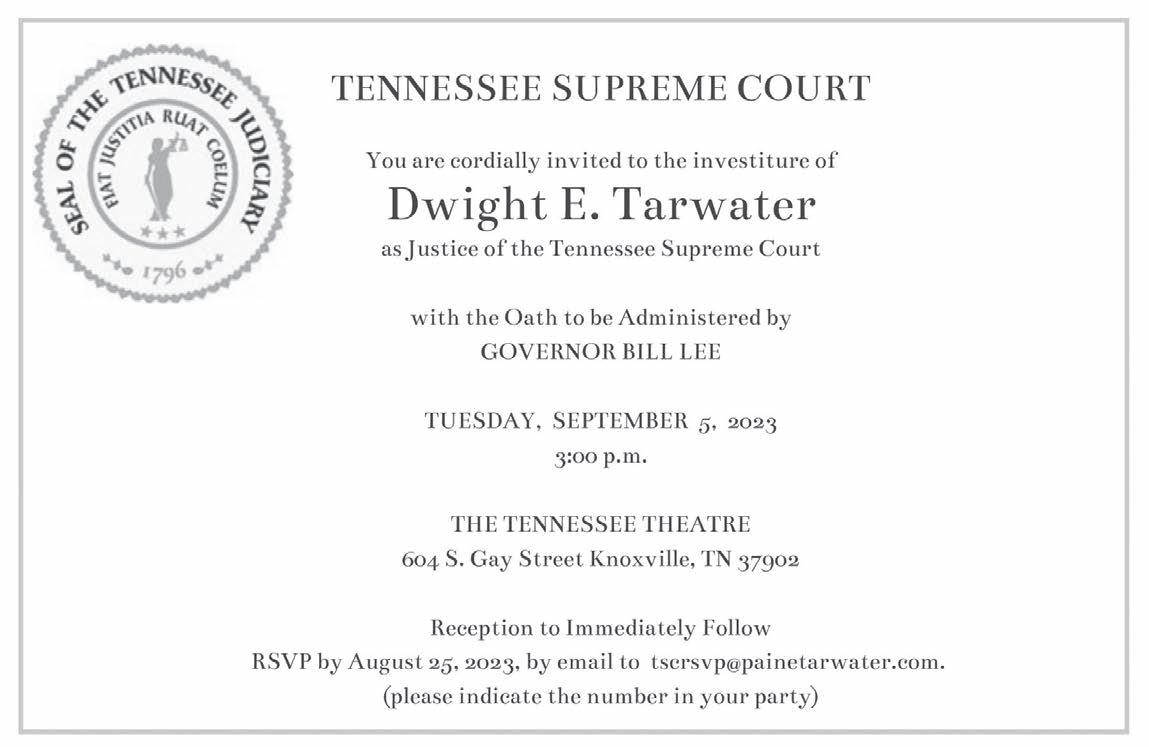
12 August 2023 DICTA Anniversary Gala CELEBRATING 40 YEARS OF ADVANCEMENT CHEROKEE COUNTRY CLUB KNOXVILLE, TENNESSEE INVITATION TO FOLLOW 6 PM 17 NOV please save the date 40th
HELLO MY NAME IS
By: Jennifer Franklyn Realty Trust Group, LLC

OSCAR BUTLER
This month’s “Hello, My Name Is…” q-and-a column allows KBA members to get to know Oscar Butler, an Associate Attorney at Barnes and Fersten, PLLC. Oscar practices in criminal defense, specializing primarily in the defense of DUI and DUI-related offenses. Oscar is a graduate of the Lincoln Memorial University Duncan School of Law, from which he graduated in May of 2019. He attended Maryville College for his undergraduate degree and graduated in 2015 with a bachelor’s degree in Political Science.
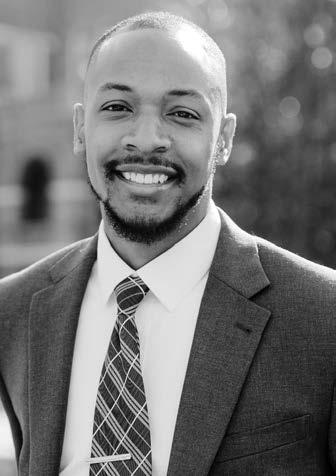
What is the best advice you have ever received? Carry yourself like you want to be perceived because you never know who is watching.
Why did you decide to stay in Knoxville?

I decided to stay in Knoxville because I fell in love with East Tennessee. I’m from Murfreesboro, which was previously a small town (although it has grown rapidly in recent years), and while Knoxville is a relatively big city, it has that small town “feel” that I have always loved.
Describe your perfect “day off” in Knoxville: My perfect day off includes playing golf, maybe drinking a few adult beverages, and hanging around the house with my wife Sarah.
If you gave a TED Talk, what would it be about and why? My TED Talk would be titled “Play Stupid Games, Win Stupid Prizes.” I’ve come to learn that we as humans naturally struggle to accept that we cannot control everything that happens in life. But we can control the situations we put ourselves in and our reactions to those situations. If we put ourselves in a bad situation, we have to understand that there is high likelihood that we will get a bad result. Therefore, by playing “stupid games,” we ultimately will win “stupid prizes.” The goal is to avoid the “stupid games” and not worry about the things we can’t control, in order to have a more peaceful and stress-free life.
What do you find most meaningful in your work?
I find most meaningful the help and assistance that my work can provide the community on a daily basis. Our criminal justice system is a complex and ever-changing environment. Being able to educate a person charged with a crime, while working to get the best result possible, has proven to be the thing I enjoy the most.
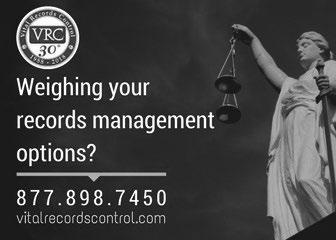
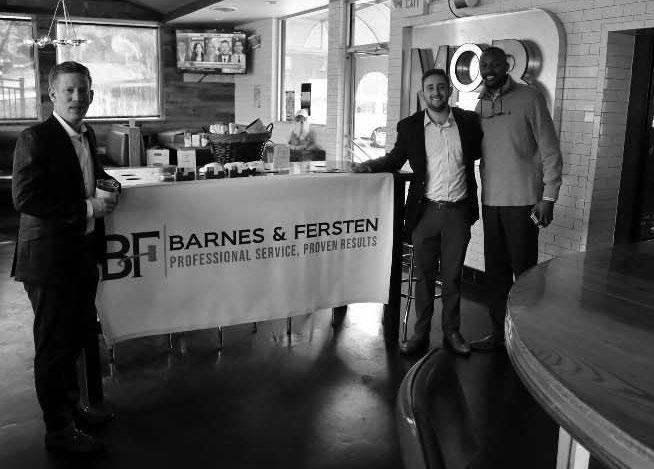
DICTA August 2023 13
By: James Snodgrass
Kramer Rayson LLP
 William Quinlan
William Quinlan
2L,
University of Tennessee College
of Law
WHAT DO YOU MEAN WE’RE GETTING SUED—THE COMPUTER HIRED THEM
Many of you are likely aware of the pitfalls of the attorney who used ChatGPT in drafting his response to a motion to dismiss in the U.S. District Court for the Southern District of New York. To put it simply, it did not go well. In his response to a show cause order, the New York attorney noted that he consulted “the general artificial intelligence website Chat GPT” and cited six cases which the Court later “found to be nonexistent.”1
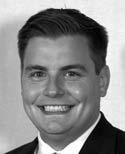
Artificial Intelligence (AI)2 has been a main topic of discussion in both the future of the practice of law and business. At its best, the possibilities of AI are endless, as it has demonstrated the capacity to do everything from writing articles for major news outlets3 to driving autonomous taxis and trucks across the world.4 However, the possibilities of AI do not come without risks and flaws, as clearly detailed above. The same concerns have presented themselves in the world of employment law.
On May 18, 2023, the Equal Employment Opportunity Commission (“EEOC”) issued a technical assistance document on the use of AI in the hiring process, specifically the potential adverse impact of AI software and algorithms under Title VII of the Civil Rights Act of 1964 (“Title VII”).5
The EEOC’s listed these examples of AI’s potential uses:
• Resume scanners that prioritize applications using certain keywords;
• Employee monitoring software that rates employees on their keystrokes;
• “ Virtual assistants” that ask job candidates about their qualifications and reject those who do not meet pre-defined requirements;
• V ideo interviewing software that evaluates candidates based on their facial expressions and speech patterns; and
• Testing software that provides “job fit” scores for applicants regarding their personalities, aptitudes, cognitive skills, or perceived “cultural fit.”
The Technical Guidance updated the EEOC’s current position on AI, including:
1. An employer’s use of an AI algorithm may be a “selection procedure” under Title VII, and employers should analyze whether the use of such a tool has an adverse impact on a protected category of employees.
2. An employer is responsible under Title VII for its use of AI in the hiring process, even if the tool is designed or administered by a third-party vendor.
3. AI algorithms may not cause selection rates that are “substantially less” than if an alternative procedure was used. The Technical Guidance details the “fourth-fifths rule” for disparate impact, meaning that a rate is “substantially less” if a result is less than four-fifths of the representation that would occur absent that selection procedure. Ultimately, the use of technology and AI in employment selection falls under the same, uniform guidelines as employment selection without the technology. 6
The use of AI tools in recruitment and hiring have been advertised as having the potential to increase diversity and reduce unconscious
biases. However, the use of these tools can result in the type of disparate impact that the EEOC has cautioned against, like Amazon’s resume screening software designed to “spit out the top five” candidates based on their training and credentials.7 Amazon spent several years designing this software, only to learn that it was biased against women. The software was based on reviewing patterns in resumes for positions to rank and screen candidates based on past applications who had been successful in male-dominant industries. As the Reuters article breaking this story summarized: “In effect, Amazon’s system taught itself that male candidates were preferable,” including penalizing resumes that included the word “women’s chess club captain,” or where the applicant attended an all-women college.8
While it is difficult to imagine that the use of AI in the hiring process is widespread in Knoxville, these tools are increasingly prevalent. AI will soon be inherent in resume screening and testing mechanisms regularly presented to companies by software vendors. The EEOC’s Technical Guidance provides several key takeaways. First, employers should consistently evaluate the potential for disparate impact of any technology used in the hiring process. Next, employers should be cautious of any pitches from software vendors about the use of AI. In particular, the employer should obtain information about the vendor’s practices. The EEOC recommends that, at a minimum, this includes getting answers to “whether steps have been taken to evaluate whether use of the tool causes a substantially lower selection rate for individuals with a characteristic protected by Title VII.” In the event an employer uses a technology from a third-party that does produce a disparate impact, the employer may still be held liable for the Title VII violation.9 As the use of AI does not appear to be going away in the business world, it is important for employers to stay abreast of new technology and evaluate its impact on employment issues.10
1 See Mata v. Avianca, Inc., Case No. 1:22-cv-01461, [Doc. 46], (S.D.N.Y. June 6, 2023).
2 Congress defined “AI” as a “machine-based system that can, for a given set of human-defined objectives, make predictions, recommendations or decisions influencing real or virtual environments.” 15 U.S.C. § 9401(3).
3 Bernard Marr, Artificial Intelligence Can Now Write Amazing Content – What Does That Mean For Humans?, Forbes (Mar. 29, 2019), https://www.forbes.com/sites/ bernardmarr/2019/03/29/artificial-intelligence-can-now-write-amazing-contentwhat-does-that-mean-for-humans?/.
4 Naveen Joshi, How AI Can Transform the Transportation Industry, Forbes (July 26, 2019), https://www.forbes.com/sites/cognitiveworld/2019/07/26/how-ai-cantransform-the-transportation-industry/.
5 EEOC Technical Guidance, Select Issues: Assessing Adverse Impact in Software, Algorithms, and Artificial Intelligence Used in Employment Selection Procedures Under Title VII of the Civil Rights Act of 1964, https://www.eeoc.gov/select-issuesassessing-adverse-impact-software-algorithms-and-artificial-intelligence-used
6 Id.
7 See Jeffrey Dastin, Amazon Scraps Secret AI Recruiting Tool that Showed Bias Against Women, Reuters (Oct. 9, 2018), https://www.reuters.com/article/usamazon-com-jobs-automation-insight/amazon-scraps-secret-ai-recruiting-toolthat-showed-bias-against-women-idUSKCN1MK08G.
8 Id.
9 EEOC Technical Guidance, supra note 5.
10 In addition to the disparate impact concerns under Title VII, the use of AI potentially implicates, at a minimum, the Americans with Disabilities Act (ADA) and Fair Labor Standards Act (FLSA). See Department of Justice, Algorithms, Artificial Intelligence, and Disability Discrimination in Hiring (May 12, 2022), https://www.ada.gov/ resources/ai-guidance/; Bradford J. Kelley, Wage Against the Machine: Artificial Intelligence and the Fair Labor Standards Act, 34 Stan. L. & Pol’y Rev. 261 (2023).
14 August 2023 DICTA
AI UPDATE
LEGAL UPDATE
By: M. Akram Faizer Professor of Law LMU Duncan School of Law
THE MAJOR QUESTIONS DOCTRINE – NO MINOR MATTER
Does the Secretary of Education have the authority under the Higher Education Relief Opportunities for Students Act of 2003 (the “HEROES Act”) to establish a student loan forgiveness program that would benefit 98.5% of borrowers and cost approximately $430 billion?1 In Biden v. Nebraska, the Supreme Court applied the little understood major questions doctrine to conclude the Secretary was not given this authority and invalidated the plan.2 The purpose of this piece is to explain major questions doctrine and elaborate upon whether it is a proper means of protecting against agency overreach or whether it portends too large a role for politically unaccountable and itinerant federal judges in the administrative process.
All lawyers know that both bicameralism3 and presentment4 are required to enact a federal law. Fewer have an in-depth understanding of how federal laws are enforced. Administrative law, or the law of government, is designed to cabin a sitting president’s authority and discretion to “take Care that the Laws be faithfully executed.”5 It articulates the procedures the government must follow in enforcing duly enacted law and is designed to ensure that federal laws are enforced by competent and politically accountable agency administrators. Even more than the transfer of power through elections, it is the procedural requirements of administrative law that distinguish liberal democracies such as the United States from authoritarian democracies such as Russia or Turkey.
For much of this nation’s history, federal agencies enforced federal law by lawsuit. For example, the Sherman Antitrust Act of 1890 authorized the Justice Department to commence suit in federal court against anticompetitive abuses of monopoly business power.6 This framework proved insufficient as the country grew and changed dramatically with the constitutional moment that was President Roosevelt’s New Deal, also called the “Second Bill of Rights,” because it dramatically expanded the size and responsibility of government agencies to address the social and economic cataclysm that was the Great Depression. New Deal agencies were given power to enforce legislation by way of internal agency prosecutions and adjudications, subject to deferential judicial review. Though this facilitated a growth in agency power, it disquieted separation of powers purists who were concerned that providing agencies with complete prosecutorial discretion, without governing rules beyond broad statutory text, undermined the American system of checks and balances.7
The Administrative Procedure Act of 1946, signed into law towards the end of Democratic Party hegemony by President Truman, represented a compromise between New Deal enthusiasts and separation of powers purists by incorporating transparency and due process into the administrative state by supplementing agency adjudicatory power with the requirement that agencies issue rules, subject to public notice and comment, and deferential, though not supine, judicial review designed to protect against abuses of agency discretion.8
Though initially uncontroversial, the APA’s grant of broad rulemaking discretion to agencies became more contentious in the era of divided government that began in the late 1960s because Congressional Democrats accused sitting Republican presidential administrations of abusing the rulemaking process to improperly delay and dilute social
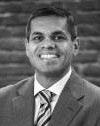
welfare and regulatory legislation. Chevron U.S.A., Inc. v. National Resources Defense Council,9 sought to empower sitting presidential administrations and their appointed agency heads at the expense of Congress and reviewing courts.
Chevron involved the EPA’s interpretation of the term “stationary sources” under the Clean Air Act Amendments of 1977, and required “new or modified major stationary sources” of air pollution to comply with EP’’s stringent permit requirements.10 Under the Carter Administration, the EPA construed “stationary source” to mean each individual piece of pollution-emitting equipment.11 However, after the Reagan Administration took office, the EPA redefined “stationary source” to mean the entire aggregate plant—allowing firms to avoid permit requirements by offsetting the emissions from new equipment with reduced emissions from old equipment in the same plant.12
The Supreme Court held that because the statutory text was ambiguous, the legislative history silent on the precise issue, and the general statutory purpose of improving air quality too broad and self-contradictory to be decisive, the reviewing court should defer to the EPA’s “reasonable accommodation of manifestly competing interests.”13 Essentially, the Court found broadening the discretion afforded democratically accountable agency administrators with public policy expertise is preferable to heightened review by itinerant and unaccountable federal judges purporting to enforce statutory text.
Chevron has had its critics. Skeptics of the administrative state have raised concerns that agency deference facilitates a liberally biased regulatory ratchet by undermining the judiciary’s proper role.14 It has come under even closer scrutiny in an era of Congressional immobility that has led presidential administrations to increasingly bypass a polarized Congress and instead use agency rulemakings and declarations to implement policy change. In this author’s opinion, this explains the Major Questions Doctrine, which is a response to problems created by Chevron that were unanticipated by the APA. Essentially, the Major Questions Doctrine requires reviewing courts to grant no deference to agency interpretations when they are of central relevance to statutory schemes that are of major economic and political significance.
In FDA v. Brown & Williamson Tobacco Corp., the Court reversed an FDA action asserting regulatory jurisdiction over tobacco under the Food, Drug and Cosmetic Act (FDCA) by rejecting application of Chevron Deference and replacing the FDA’s statutory interpretation of the FDCA with its own, which was that the FDA lacked regulatory power over tobacco.15
In King v. Burwell, the Roberts Court upheld the IRS’s rulemaking under the Patient Protection and Affordable Care Act related to tax credits for health policies purchased on both state and federal exchanges by applying its own interpretation of the ACA without any deference given to the IRS.16
West Virginia v. EPA involved the legality of the Obama Administration’s 2015 EPA rule, known as the Clean Power Plan, that sought to mandate CO2 emission reductions from existing pollution sources based on Clean Air Act § 111 (d).17 Controversially, CPP authorized EPA to mandate industry-wide “generation shifting” from high to low-emitting sources (i.e., from coal-fired power plants to natural
continued on page 26
DICTA August 2023 15
RECENT DEVELOPMENTS IN TENNESSEE FIREARMS LAWS
Each year, a vast number of firearm bills are introduced in the Tennessee legislature, and often passed. The handgun carry permit statutes have been subject to numerous changes over the years.

Carrying Handguns-With Permits or Otherwise
In 1996, Tennessee joined the list of “shall issue” states, issuing permits to carry handguns to those with clean records, without requiring proof of need.1 Permit holders may legally carry a handgun concealed, or openly, except where prohibited. In January 2020, concealed-only carry permits were authorized.2
The next step in legal firearm possession, carrying a handgun without a permit, became effective July 1, 2021.3 This applies to most Tennesseans (and non-residents) who may legally possess a handgun.
Other Firearms
A 2019 amendment changed the definition of “firearm” as not including an “antique firearm,” generally muzzleloaders and certain replicas.4
Tennessee formerly restricted possession of certain weapons, machine guns, suppressors (“silencers”), short-barrel rifles and shotguns, except in compliance with the federal National Firearms Act (NFA).5 Essentially, the possessor of these items goes through the federal background check and paid a $200 tax on each item.
Machine guns remain restricted items, but suppressors were removed from restricted list in 2017. The federal requirements remain in effect, requiring NFA compliance to legally possess a suppressor under federal law.
Similarly, in July 2022, the legislature removed short-barrel rifles (barrels under 16 inches) and shotguns (barrels under 18 inches) from the state’s list of restricted firearms.6 As with suppressors, federal requirements remain in effect to legally possess such rifles and shotguns.
Defenses for Manufactures, Licensed Sellers or Transferors
A new statute will give a defense to manufacturers, licensed sellers or transferors of firearms, ammunition or their component parts, barring civil actions against these sellers resulting from the criminal misuse of firearms, ammunition or their components. The defenses do not apply to:
1. Those “involved directly in the crime giving rise to the action;”
2. A transferor convicted under 18 U.S. Code § 924(h)
(knowing or has reason to believe the product will be used to commit a felony);
3. Action against a seller for negligent entrustment or negligence per se;
4. Knowingly violating a federal or state statute applicable to the sale or marketing of the product, such violation being the sole proximate cause of the harm;
5. Action for breach of contract or warranty in connection with the purchase; or
6. An action for death, injuries or property damage resulting directly from a defect in the design or manufacture of the product when used as intended or foreseeable manner. When the discharge is caused by a criminal offense, such act is considered the sole proximate cause.
Red Flag Law
Following the shooting at The Covenant School in March, Governor Bill Lee called for a special legislative session to enact a “red flag” law. Such laws allow a court to consider whether a person constitutes such a risk that their firearms should be removed and the person not allowed to purchase or receive firearms.
Such laws vary from state to state, as to who may file the petition. Some states authorize police, family members, employers and teachers to file petitions. States also vary as to whether orders may be issued ex parte or only after a hearing.
The proposed legislation, SB 1564 and HB 1574, would create a new action known as a petition for a temporary mental health order of protection (“TMHOP”), Tenn. Code Ann. § 39-171367 et seq
Only a law enforcement officer or agency may file a petition to obtain a TMHOP.7 The petition may be filed in the general sessions, circuit, chancery, or juvenile courts, in the county where the respondent lives.8
The petition must allege that the respondent poses a substantial likelihood of serious harm by having a firearm in his possession or by obtaining a firearm, with a sworn statement providing the respondent’s specific statements, actions or facts that give rise to the petition.9
Upon filing of a petition, the court must order that a hearing be held three to five days after the petition is filed, with notice to the respondent. Upon request of the respondent, the hearing may be delayed for five days,
16 August 2023 DICTA
but in no event more than ten days.10
A respondent may hire an attorney or request a court-appointed attorney.11 If the court determines that the respondent is not able to understand the nature of the proceedings and cannot communicate with counsel, the court may appoint another person as respondent’s guardian ad litem.12
After the hearing, if the court finds, by clear and convincing evidence, The court shall issue a TMHOP, valid for up to 180 days, if:
1. Respondent poses a current and ongoing substantial likelihood of serious harm by the respondent having or receiving a firearm or ammunition;
2. The respondent has a mental illness, serious behavioral condition or serious emotion disturbance; and
3. No reasonable alternative is available by law.13
The TMHOP must also order respondent’s dispossession of firearms and ammunition. The respondent is ordered immediately to surrender a license to carry a handgun and all firearms and ammunition in respondent’s custody, control or possession.14
The TMHOP order terminates respondent’s legal right to physical possession of all firearms and ammunition. The respondent may transfer firearms and ammunition to a third party or law enforcement, within 48 hours of issuance of the order. The respondent is also required to complete an affidavit of firearms dispossession and return it to the court within three days, or the court will issue an order, that respondent appear and show proof of dispossession.15
Interestingly, the issuance of a TMHOP does not constitute an adjudication of the respondent as a mental defective for purposes of 18 U.S. Code § 922.16
The petitioner may request an extension of the TMHOP before expiration of the order.17
The respondent may file one motion to vacate the order and may file a motion to a hearing after every extension of the order, if any.18
Once the TMHOP has been entered, the petitioning law enforcement agency shall enter the order in the National Crime Information Center (NCIC) and similar state databases.19
The TMHOP has teeth. It is a Class E felony for a person, knowing he is subject to a TMHOP, purchasing or possessing a firearm or ammunition.20 Likewise, anyone who transfers a firearm to someone, known to be subject to a TMHOP, commits a Class E felony.21
Court Decisions Affecting Firearms

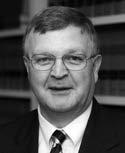
Court decisions, not just legislation, affect firearms. The United States Supreme Court handed down more substantive Second Amendment decisions in the last fifteen years than the previous two centuries. District of Columbia v. Heller22 recognized the right of
COVER STORY
By: James E. Wagner Frantz, McConnell & Seymour
individuals to possession ordinary firearms in their homes under the Second Amendment. McDonald v. City of Chicago23 extended the Second Amendment’s right to bear arms to the states through the Fourteenth Amendment. Caetano v. Massachusetts24 held that the Second Amendment protected arms (a stun gun) not in existence at the time of the founding. Finally, in New York State Rifle & Pistol Association v. Bruen, 25 the Court struck down New York’s “proper cause” requirement” before issuing a handgun carry permit, because the Second and Fourteenth Amendments protected an individual’s right to carry a handgun for self-defense outside the home.
Relevant to the red flag law, in June the Supreme Court voted to hear an appeal in United States v. Rahimi, where the Fifth Circuit overturned defendant’s conviction for possession of firearm while subjected to a domestic order of protection.
Earlier this year, an agreed order in Beeler v. Long, the Commissioner of the Department of Safety, recognized, that Tennessee’s restrictions on persons aged 18 to 20, carrying handguns or obtaining carry permits, on the basis of age alone, violated the Second and Fourteenth Amendments.26
Obviously, the subject of firearms and the law will continue to be a hot topic.
1 Tenn. Code Ann. § 39-17-1351.
2 Tenn. Code Ann. § 39-17-1366.
3 Tenn. Code Ann. § 39-17-1307(g).
4 Tenn. Code Ann. §39-11-106(a)(1) and (13). Also see Tenn. Atty. Gen. Opinion 1919.
5 Tenn. Code Ann. § 39-17-1302(d).
6 Tenn. Code Ann. § 39-17-1302(a)(4).
7 Tenn. Code Ann. § 39-17-1368(a).
8 Proposed Tenn. Code Ann. § 39-17-1368(a)(2) and (15).
9 Proposed Tenn. Code Ann. § 39-17-1368(a)(2).
10 Proposed Tenn. Code Ann. § 39-17-1368(b).
11 Proposed Tenn. Code Ann. § 39-17-1368(b)(B)(1)(B).
12 Proposed Tenn. Code Ann. § 39-17-1368(b)(1)(ii).
13 Proposed Tenn. Code Ann. § 39-17-1368(c).
14 Proposed Tenn. Code Ann. § 39-17-1368(e)(5).
15 Proposed Tenn. Code Ann. § 39-17-1372.
16 Proposed Tenn. Code Ann. § 39-17-1368(g).
17 Proposed Tenn. Code Ann. § 39-17-1371(a).
18 Proposed Tenn. Code Ann. § 39-17-1370(a).
19 Proposed Tenn. Code Ann. § 39-17-1373(b).
20 Proposed Tenn. Code Ann. § 39-17-1374(c).
21 Proposed Tenn. Code Ann. § 39-17-1374(d).
22 554 U.S. 570 (2008).
23 561 U.S. 742 (2010).
24 577 U.S. 411 (2016).
25 142 S.Ct. 2111.
26 Beeler v. Long, U.S. District Court for the Eastern District of Tennessee #3-21-cv152.
DICTA August 2023 17
SIMPLE THINGS
By: Melissa B. Carrasco
Egerton, McAfee, Armistead & Davis, P.C.
SQUEEZE
When was the last time you saw a lemonade stand? Not the one in the booth at the Tennessee State Fair or the one in the food truck at the 407 Flea Market—but a little table with a little sign made by a young entrepreneur learning the hard lessons of free enterprise economics. The recipe was simple:
1 cup of lemon juice (freshly squeezed) +
Two band-aids for knicked fingers +
1 cup of sugar +
1 bruised knee from dragging the table to the sidewalk +
A small cooler of ice +
Waiting and waiting and waiting to sell one glass of lemonade +
The jingle of two quarters in your cup.
There are few things as quintessentially summer—or as hard to find—as a lemonade stand. In many ways, it is a metaphor for growing up—the sweetness of success mixed with the sourness of waiting and a lot of bruises and knicks along the way. Marshall was well-acquainted with all of it.
When he was born, the medical community and much of society labelled Marshall “defective.”1 He was born in 1859 with achondroplasia,2 a genetic condition that slows bone growth and generally causes bowed legs, shortened arms and legs, and large head size.3 He also had kyphosis, or severe curvature of the spine, usually causing his back to hunch over.4 Marshall’s father was a well-known physician and professor at the New York Medical College; he knew full well that Marshall’s path was not going to be the same as other children of that era.5
Little Marshall was named after a distant cousin, Marshall Pickney Wilder, who was one of the most famous horticulturalists of his time.6 But, from the start, life was destined to be a sour one for tiny Marshall. The ADA would not be enacted for another 131 years, and individuals with disabilities had few opportunities and even fewer rights. In fact, for Marshall’s entire life, there would be an ongoing, public debate about whether those who were “defective” had any place within society.7
Those were the lemons handed to Marshall on the day he was born. History is a curious thing. Historians records significant events, battles, treaties, and proclamations. Very rarely does anyone memorialize the day a person realizes their life is going to be different—not because “it is what it is” but because he chooses for it to be different. Marshall did.
When I became old enough to want to select a life occupation, I found myself in a serious quandary. All the callings to which boys at first naturally incline seemed closed against me. I couldn’t be a clown in a circus or enter for a walking-match, for my legs were too short. I couldn’t preach, for my head wouldn’t reach the top of the pulpit. There was no chance for me in Congress, for the Speaker couldn’t see me to recognize me, unless I stood on a chair, which would be contrary to the Rules of the House, and I couldn’t become John L. Sullivan’s8 rival, for my fighting weight was too light.
It occurred to me one day that there were a good many solemn people in the world, and none too many men who made a business of provoking their fellow-men to laugh. If I could persuade enough people to listen to me, I might make it my business to smile for revenue. Incidentally, I might do some good, for if I, with the handicapping I was enduring,
could smile and be merry, any big healthy fellow ought to go out into his own backyard and kick himself whenever he found himself becoming miserable. So, I went into the “humorous entertainment” business. I also succeeded—so other folks say.9
“Succeeded” is an understatement. He appeared in twelve (12) silent movies. He was the editor of a ten (10) volume series entitled The Wit and Humor of America, a collection of fables, poems, and humorous short stories by authors such as Henry Ward Beecher, Elizabeth Stuart Phelps, Phoebe Cary, and Nathaniel Hawthorne to name a few.10 He travelled across Europe, and he was a favorite in the British Court. He was named the Funniest Man in America, specializing in humorous monologues and the timeless mother-in-law joke.11 At a time when individuals with disabilities often were relegated to side shows and vaudeville, Marshall made a name for himself on stage and off without marketing himself as anything other than an entertainer.
In the foreword to Volume I of The Wit and Humor of America Marshall wrote, “This is really a jolly old world, and people are very apt to find just what they are looking for. If they are looking for happiness, the best way to find it is to try to give it to others. If a man goes around with a face as long as a wet day, perfectly certain that he is going to be kicked, he is seldom disappointed.”12 That was Marshall’s perspective: you always see more of what you are looking for.
Marshall passed away in 1915. So many people felt the loss. His friend, author Elbert Hubbard, wrote the following obituary.
He was a walking refutation of that dogmatic statement, Mens sana in corpore sano 13 His was a sound mind in an unsound body. He proved the eternal paradox of things. He cashed in on his disabilities. He picked up the lemons that Fate had sent him and started a lemonade-stand. * *
No man ever got more fun out of his work than he. This, of course, was also the secret of his success. His fun was spontaneous, and when he told the old jokes over, he always hypnotized himself into the belief that it was a brand-new audience. He gave big value, and he grew rich by giving.14
Lemonade is a simple thing: water, sugar, lemon juice-stir. Marshall Pickney Wilder squeezed every drop out of the lemons that life handed him and made fresh lemonade by simply being himself.
1 John Gerdtz, Disability & Euthanasia: The Case of Helen Keller & the Bollinger Baby, Life & Learning XVI 491-92 (2006); see also John Dill Robertson , M.D., The Case of the Bollinger Baby, Journal of the American Medical Association Vol. LXV, No. 23, 2025 (Dec. 4, 1915), available at http://jama.jamanetwork.com/article. aspx?articleid=447318.
2 Leadership Now, When Life Gives you Lemons, Make Lemonade (Jan. 17, 2015), https://www.leadershipnow.com/leadingblog/2015/01/when_life_gives_you_ lemons_mak.html, last visited July 8, 2023.

3 Johns Hopkins Medicine, Achondroplasia, https://www.hopkinsmedicine.org/health/ conditions-and-diseases/achondroplasia, last visited July 8, 2023.
4 Leadership Now, supra n. 2; see also American Academy of Orthopaedic Surgeons, Kyphosis, https://orthoinfo.aaos.org/en/diseases--conditions/kyphosis-roundbackof-the-spine/#:~:text=Kyphosis%20is%20a%20spinal%20disorder,but%20is%20 common%20during%20adolescence, last visited July 8, 2023.
continued on page 24
18 August 2023 DICTA
* *
IN LIMINE: PROFILING FUTURE JDS
By: Allison Starnes-Anglea Former Director of Career Services Lincoln Memorial University Duncan School of Law Recruiting Professional

FAJORAH POTEAU LINCOLN MEMORIAL UNIVERSITY DUNCAN SCHOOL OF LAW, CLASS OF 2025
Knoxville Bar, meet Fajorah Poteau. Fajorah is a dual degree rising second year law student and Master of Business Administration student at Lincoln Memorial University. The child of immigrant parents from Haiti, Fajorah’s experience as a child watching her parents navigate a new set of systems had a lasting impact on her desire to identify injustices. She recalls the social, cultural, and educational systems her parents navigated when they arrived in the United States of America. Fajorah explains, “Seeing my parents deal with certain challenges sparked the belief in me that no matter our background, every human deserves rightful justice when they have been unfairly or wrongfully treated.” Observing biased systems in every sphere of life, Fajorah decided to attend law school. “I have always been interested in learning about the law and why things are the way they are in this country,” she says.
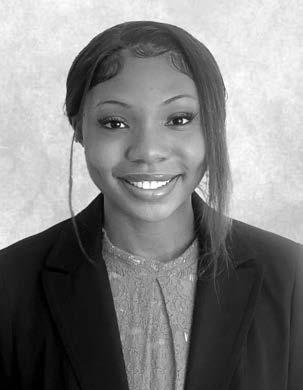
Fajorah grew up in Georgia with a strong support system. Moving away from home for the first time in order to attend law school was a major decision that affected not just Fajorah, but her entire family. Moving to Knoxville meant Fajorah had to learn how to exist independently and outside of her comfort zone. Staying engaged in the Knoxville community has allowed Fajorah to find her footing. She says, “I have enjoyed adjusting to Knoxville by doing things such as discovering unique restaurants, biking on the trails, participating in the river cruises, and appreciating the scenic nature views.” She also credits the LMU Law Student Bar Association for offering first year students a variety of opportunities to feel welcomed into the community. Additionally, Fajorah appreciates all the Knoxville Bar Association (KBA) does to bring law students into the network of lawyers and judges in the area. She says, “The Knoxville Bar Association has connected me and my peers” to this community of professionals.
Admittedly, she wishes there was more programming offered to first year law students who have relocated to Knoxville from outside of Tennessee. “Knoxville should strive to build a diverse field of legal professionals by hosting events that target law students early on,” she explains. Bringing new-to-Knoxville students together during their transitioning period may impact their decision on whether to remain in Knoxville after graduation. Making the decision on whether to stay in Knoxville, return to their support system, or take off for a new place is a heavy decision for Knoxville’s out-of-area law students.
Taking advantage of all East Tennessee offers has shown Fajorah the benefits of considering a life outside of her comfort zone. Wherever she
begins her career, she knows what she will look for in an opportunity. “I want to be in a place where I can grow in my career, but also be grounded in my life,” Fajorah says.
When it comes to her current summer experience, Fajorah credits a popular Knoxville Bar Association program for expanding her interests. Thanks to Fajorah’s mentor in the KBA Buddy Match program, Court of Criminal Appeals Judge Kyle Hixson, she is growing her legal knowledge base and spending her 1L summer learning about familyimpacted aspects of criminal law. While she came to her dual programs at Lincoln Memorial University with a focus on the intersection between law, policy, and business, Judge Hixson encouraged Fajorah to consider learning more about areas of law that were not originally on her radar. This summer, Fajorah externs for the Solicitor General’s Office in Dekalb County, Georgia. “I have gotten a chance to sit in on cases with domestic violence victims,” where Fajorah explains she “grasped an understanding of the horrors that people experience every day, and how much they depend on the legal system to change the trajectory of their story,” she says.
Like most law students, Fajorah is using this hands-on experience to inform her career goals. “It is important for me to gain as much perspective and experience as possible,” she says. As she adds in the new, she continues to be motivated by what she has personally observed as a child of immigrant parents. She watched her parents navigate local, state, and national systems as they entered the American culture. Whether it was a healthcare, business, or real estate system, Fajorah uses these personal experiences to shape how she interacts with her hands-on educational opportunities.
While Fajorah is not committed to a specific career goal once she obtains her J.D./M.B.A., she is allowing the educational process to shape the type of lawyer she wants to be. “I want to inspire future generations to acquire success in the legal field,” she says. Wherever she lands, one thing will remain steadfast: her appreciation for the journey taken. “Although it brings a lot of pressure, knowing that I will be the first attorney in my entire bloodline is a huge motivation. I recognize that I am on this journey not only for myself, but to prove to the generations before me that their hard work has paid off,” she says.
Inclusive Hiring Tip:
“I’m trying to offer her a job; why isn’t she answering my phone call?!” A common challenge with law student hiring is how to reach candidates for interview requests, follow-ups, and to make job offers. Because there are four generations in our profession (Baby Boomer, Gen-X, Millennial, and Gen-Z), there are four preferred methods of communicating information: in-person, phone call, e-mail, and text or app, respectively. Employers must communicate how they prefer to communicate. To foster inclusive and anti-agist hiring, communicate how candidates will be reached and how your office should be reached by candidates.
DICTA August 2023 19
SCHOOLED IN ETHICS
By: Judy M. Cornett University of Tennessee College of Law
NEW ABA FORMAL ETHICS OPINION DISCUSSES CONSTRAINTS ON NONLAWYER ASSISTANTS’ INTAKE ROLE

Most lawyers delegate some duties to their nonlawyer employeesparalegals, law clerks, and receptionists. A recent ABA Formal Opinion addresses the intake tasks that can ethically be delegated to nonlawyer assistants.1 The Opinion is based on three assumptions: (1) the tasks undertaken by the nonlawyers would not constitute the practice of law in the jurisdiction; (2) the delegating lawyers “have met their obligations for management and supervision of the nonlawyers” under Model Rule of Professional Conduct 5.3; and (3) the “prospective clients are given the opportunity to consult with the lawyers to discuss the matter.”2
Because Model Rule 5.5(a) prohibits a lawyer from assisting another in the unauthorized practice of law, a lawyer cannot delegate any task to a nonlawyer assistant that would constitute the practice of law.3 According to the Opinion, the line is most easily crossed when the client asks questions of the nonlawyer. Although the definition of the “practice of law” will vary depending on the jurisdiction, the ABA posits that nonlawyers would be engaged in the practice of law if they answer questions requiring “the application of law to the facts of the case,” in contrast to answering a question about “a firm procedural matter.”4 For example, a nonlawyer cannot ethically answer questions about (1) “what legal services the client should obtain from the lawyer to address the client’s objectives”; (2) negotiation of the lawyer’s “fees or expenses”; or (3) “interpretation of the rights and responsibilities set forth in the engagement agreement.”5 Tenn. Code Ann. § 23-3-103 prohibits engaging in the “practice of law” or “law business” as defined in section 23-3-101:
(1) “Law business” means the advising or counseling for valuable consideration of any person as to any secular law, the drawing or the procuring of or assisting in the drawing for valuable consideration of any paper, document or instrument affecting or relating to secular rights, the doing of any act for valuable consideration in a representative capacity, obtaining or tending to secure for any person any property or property rights whatsoever, or the soliciting of clients directly or indirectly to provide such services;
(3) “Practice of law” means the appearance as an advocate in
a representative capacity or the drawing of papers, pleadings or documents or the performance of any act in such capacity in connection with proceedings pending or prospective before any court, commissioner, referee or any body, board, committee or commission constituted by law or having authority to settle controversies, or the soliciting of clients directly or indirectly to provide such services.
In Formal Ethics Opinion 85-F-94, the Tennessee Board of Professional Responsibility opined that a paralegal cannot ethically appear at a docket sounding in open court because doing so requires the paralegal to appear in a representative capacity before a tribunal, which constitutes the practice of law.
Lawyers must also comply with Rule 5.3, which requires a partner, a managing lawyer, and a lawyer “having direct supervisory authority over a nonlawyer” to “make reasonable efforts to ensure that the nonlawyer’s conduct is compatible with the professional obligations of the lawyer.”6 Under this standard, nonlawyer assistants performing intake tasks must comply with Rule 1.18, which emphasizes the duty of confidentiality (Rules 1.6 and 1.9) and the avoidance of conflicts of interest (Rules 1.7, 1.8, and 1.9). In Formal Ethics Opinion 2003-F-147, the Tennessee Board of Professional Responsibility applied “the imputed disqualification and screening provisions” of Rule 1.10 to nonlawyer assistants.
According to the ABA Opinion, a lawyer who wishes to delegate intake tasks to a nonlawyer must “develop policies, train, and supervise [the] nonlawyer.”7 Among the tasks a nonlawyer can ethically perform, with adequate training and supervision, are

• “obtaining initial information about the matter”;
• “performing an initial conflict check”;
• “determining whether the assistance sought is in an area of law germane to the lawyer’s practice”;
• “answering general questions about the fee agreement or process of representation”; and
• “obtaining the prospective client’s signature on the fee agreement . . .”8
Because responsibility for compliance with the rules of Professional Conduct lies ultimately with the lawyer, certain intake tasks can be
If you have an idea for Schooled in Ethics column, please contact Cathy Shuck at 541-8835. continued on page 21
20 August 2023 DICTA
SCHOOLED IN ETHICS, continued from page 20
delegated only if the lawyer stands ready to consult directly with the client. Rule 1.5(b) “requires a lawyer to communicate to the client the ‘scope of the representation and the basis or rate of the fee and expenses for which the client will be responsible.’” Rule 1.4(b), which requires the lawyer to “explain a matter to the extent reasonably necessary to permit the client to make informed decisions regarding the representation,” does not explicitly apply to prospective clients, but the ABA Opinion holds that this duty of communication does apply to prospective clients.9 The ABA Opinion also cautions that, while nonlawyers can be trained to identify potential conflicts, “when a relevant or closely related name comes up in the conflict checking process, the lawyer must be the one to review the similarities and make the final determination of whether or not a conflict exists and whether . . . it is a waivable conflict.”10
O verall, the ABA Opinion recognizes that nonlawyer assistants play an important role in making legal services accessible and affordable. However, the Opinion also counsels caution in delegating intake tasks, noting that such delegation “must be ‘carefully and astutely managed.’”11 Because the Rules cited by the ABA are identical to the corresponding Tennessee Rules of Professional Conduct, Tennessee lawyers should view the Opinion as persuasive authority. Most importantly, perhaps, Tennessee lawyers should carefully review their firm policies to ensure that nonlawyer assistants are receiving training and supervision adequate for the tasks they are being asked to perform.
1 ABA Formal Opinion 506 (June 7, 2023).
2 Id. at 1 & n.3.
3 All the Model Rules cited in Formal Opinion 506 are identical to the corresponding Tennessee Rules of Professional Conduct.

4 ABA Forma Opinion 506 at 4.
5 Id.
6 Tenn. R. Prof. Conduct 5.3 (emphasis added).
7 ABA Formal Opinion 506 at 3.
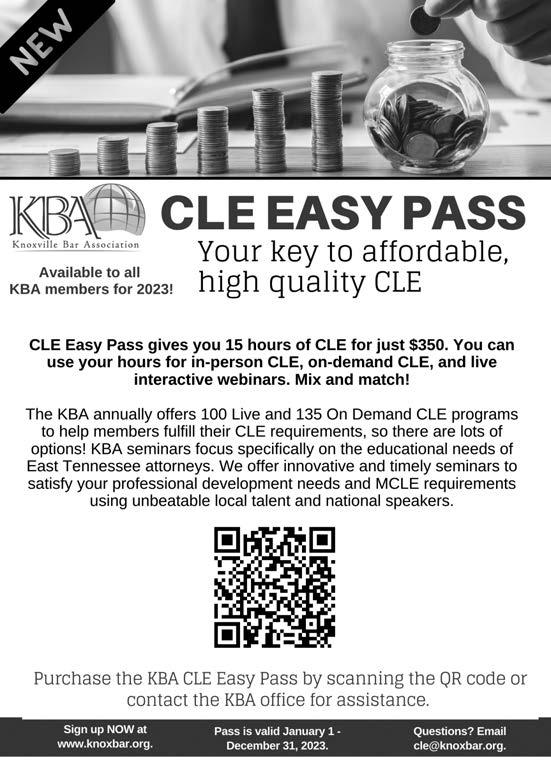
8 Id. at 3-4.
9 Id. at 3.
10 Id. at n.14.
11 Id. at 2 (quoting State Bar of Mich. Informal Op. RI-349 (2010)).
DICTA August 2023 21
MONTHLY MEETING
Plan now to attend the Barristers monthly meeting on Wednesday, August 9, starting at 5:15 pm at the outdoor patio at The Firefly at the Hilton, located at 501 W. Church Avenue, Knoxville. Social time starts at 5:00 pm. Register by clicking August 9 on the event calendar at www. knoxbar.org.
VETERANS LEGAL ADVICE CLINIC
The Veterans’ Legal Advice Clinic is a joint project of the KBA/Barristers Access to Justice Committees, Legal Aid of East Tennessee, the Knox Co. Public Defender’s Community Law Office, the UT College of Law, LMU- Duncan School of Law, and the local Veterans Affairs office. This is a general advice and referral clinic which requires attorney volunteers for its continued operation. The next Veterans Legal Clinic will be held in person at the Knoxville Community Law Office on August 9, 2023. Sign up at https://www.knoxbar.org/?pg=Upcoming-Legal-Clinics.
BARRISTERS CLE COMMITTEE
The Barristers Summer Fun CLE series continues on Thursday, August 24 at Xul Beer Co. with a presentation on “NIL: The Movement that is Sweeping the Nation.” The presentation will give a review on what led to the NCAA’s changes to name, image, and likeness legislation in 2021 and explore UTK Athletics’ response to these changes. Tickets are $30 for KBA Members / $45 for Non-Members. The CLE will be held from 5:30 - 6:30 p.m., with a reception to follow. This program is approved for 1 hour of General CLE Credit, and everyone who registers will receive one free drink ticket, thanks to our sponsor, First Horizon Bank. Register by clicking August 24 in the event calendar at www.knoxbar.org.
LAWYERS LINK UP CHARITY GOLF TOURNAMENT
The Barristers and the KBA are joining together to co-host the annual four-person scramble golf tournament on Monday, October 16, at the Tennessee National Golf Club. Revenue from the tournament goes directly to funding various charitable endeavors of the Barristers, including the efforts of the Hunger & Poverty Relief Committee. Register online at www.knoxbar.org. Limited spots still available.
WELCOME NEW MEMBERS
THE KNOXVILLE BAR ASSOCIATION IS PLEASED TO WELCOME THE FOLLOWING NEW MEMBERS:
NEW ATTORNEYS
William F. Clayton
Flatiron Construction Corp.
Lily-Ana Fairweather
Elizabeth Harwood
Merchant & Gould, P.C.
Elizabeth Ivey McCowan
Pellissippi State Community College
Carter J. Pack
Knox County Public Defender’s Community Law Office
Jennifer Schilling
Peyton N. Smith
Egerton, McAfee, Armistead & Davis, P.C.
Gunner M. Woolsey
NEW LAW STUDENT MEMBERS
Sean Freeland
Corey Lee, II
Joseph Samuel N. Lensing
Daniel A. Mendoza
Billy Quinlan
Address Changes
Please note the following changes in your KBA Attorneys’ Directory and other office records:
Celia Ball
BPR #: 040628
Jeffrey Coller, Knoxville Criminal Defense Attorney
800 S. Gay St., Suite 2000
Knoxville, TN 37929-9710
Ph: (865) 281-1000
celia@knox-attorney.com
Carter J. Pack
BPR #: 036145
VOLUNTEER BREAKFAST COMMITTEE SEEKS SPONSORS AND VOLUNTEERS
Thanks to Egerton McAfee for sponsoring the Volunteer Breakfast in June. Pictured from left to right is Dalton Howard, Kaitlyn Sell, Victoria Dishner, Adriannette Williams, Darrius Dixon, Matt Knable and Mariel Cooper. The Barristers need volunteers to sponsor breakfast or serve food on the 4th Thursday of each month at 6:15 a.m. at the Volunteer Ministry Center. The cost is $150 for sponsoring, we need 4-5 volunteers to serve breakfast to approximately 30-40 individuals, and we’re typically finished by 7:30 a.m. It’s a great way to serve the community! Please contact either Matt Knable at (865) 381-9084 or Darrius Dixon at (865) 546-4646 with any questions and/or about volunteering.

Knox County Public Defender’s Community Law Office
1101 Liberty Street
Knoxville, TN 37919-2328
Ph: (865) 594-6120 cpack@pdknox.org
T. Mitchell Panter
BPR #: 015037 U.S. Attorney’s Office 800 Market Street, Suite 211
Knoxville, TN 37902-2342
Ph: (865) 545-4167 mitchell.panter@gmail.com
Raymond E. Stephens
BPR #: 015037
Stephens IP Law
P.O. Box 26255
Knoxville, TN 37912-9555
Ph: (865) 263-6885
rstephens@stephens-ip.com
Meghan J. Treece
BPR #: 040358
P.O. Box 2232
New Tazewell, TN 37824-2232
Ph: (865) 585-2990
meghantreece.law@gmail.com
G. Keith Alley, P.C.
G. Keith Alley
Zoe McKenzie
Physical Address Change
9145 Cross Park Drive, Suite 103 Knoxville TN 37923-4565
22 August 2023 DICTA
OF LOCAL LORE & LAWYERS
By: Joe Jarret, J.D., Ph.D. Attorney, University of Tennessee

GREAT PLAINS WISDOM
It was 1985, and having spent the last 10 years serving in the military overseas, it was time to pursue my dream of becoming a lawyer while I reacquainted myself with my beloved country. Although my final destination was Stetson College of Law in St. Peterburg, Florida, I somehow convinced Uncle Sam to allow me to separate from active-duty military service in Nevada, rather than Florida, my home of record. And so, with a head full of dreams and a pocket full of mustering out pay, I bought a motorcycle, and, to quote that balladeer and favored son of Michigan, Bob Seger, “Got on that big two-wheeler and just rolled that power on,” 1 or words to that effect.
I took my time, stayed off the interstate when I could, riding leisurely through Nevada, Utah, and Wyoming, visiting a few old friends along the way. To me, the open road was exhilarating, especially a part of the South Dakota landscape, famously or infamously known as “The Badlands.” This magnificent region received its moniker from the Lakota2 people, who dubbed it “mako sica,” or “bad lands,” long ago because its rocky terrain, lack of water, and extreme temperatures, made it difficult to traverse. I did a good bit of riding through the Badlands as I rolled into a small town in search of a place to lay my head for the night.
I ultimately found a small mom & pop motel, the kind where the office is attached to a home. I rang the bell for the innkeeper and soon, an unsmiling gentleman appeared who suspiciously eyed both me and the motorcycle. “What?!” he asked. It almost sounded like a threat. “I’d like a room for the night, sir” I responded. “Fifty dollars, cash, up front. And I need to see your driver’s license,” he snapped. I was carrying one of those long leather wallets with two windows, side by side, one for my driver’s license, the other for my military ID card. When I produced the credentials, he immediately relaxed and softened his tone asking, “You a serviceman?” “Yes sir,” I replied. “I’m mustering out of the Army to go to law school on the G.I. Bill.” “Well” he said, “in that case, let’s call it thirty dollars, and you can pay me in the mornin’ cash or check. Name’s Buster, by the way.” I paid up, knowing I had an early start, accepted the key to my room which was, as my host put it, “Nice and quiet and ‘round back.” I was road weary and hungry, and was about to jump in the shower when there was a knock at the door. It was Buster. “‘Mable,’ that’s my wife, and me would be honored if you’d join us for supper.” I’m not the shy type, especially when it comes to a homecooked meal, so I immediately

accepted the invitation without pretense. Mable, it turned out, was a treasure. She warmly greeted me while setting out broad plates of baked chicken, greens, summer squash, mashed sweet potatoes, and homemade biscuits. She apologized profusely for ultimately serving “store-bought pie” for dessert. “Buster here tells me you’re a serviceman going to law school” she exclaimed. “Yes Ma’am”, I responded. “Well, how about that! Buster here fought in Korea, got a bunch of medals, but don’t bother asking him about it ‘cause he won’t tell you a thing. He also knows a thing or two about lawyers. After the war, he worked in our courthouse as a bailiff for almost 30 years. Oh, the stories he could tell! Some of them, he’ll talk about” she added with a grin.
I turned to Buster and asked, “Any advice for an aspiring lawyer?” Buster leaned back, sipped his coffee and then said, “Best lawyers I’ve seen knew that they didn’t know everything. That’s usually the problem with young lawyers. Some also don’t realize how important it is to be nice to the court staff, and I don’t just mean a judge’s assistant.” He went on. “Another thing, you gotta pay your dues. That means you’re stuck doing someone else’s work, and them getting the credit. ‘Nother thing, you oughta under-promise and over-deliver, not the other way around. Seen a lot of lawyers get in trouble for making promises they couldn’t keep. Also, you know how we say in the Army, ‘If you’re on time, you’re late!’? Always get to court early. Also, find an older, more experienced lawyer to help you, and when you learn a thing or two, help someone else.” And so it went, Buster sharing his wisdom, me writing it down in my pocket notebook as fast as I could.
It was time to go, and, as we bid our farewells, Mable insisted I come by for breakfast. I knew I was hitting the road at 5:00 AM, so, the next morning, I rolled my bike away from the hotel, fired it up, and continued my journey. I sent Mable and Buster postcards over the years, and they wrote back. They died in 1998, a week apart, according to a nephew who found the postcards I’d sent them. I’m a wiser, better person and lawyer, I hope, for having met them. Their Great Plains wisdom is with me to this day.
DICTA August 2023 23
1 Bob Seger, “Roll Me Away” © 1983, Capitol Records.
2 The Lakota are a Native American people. Also known as the Teton Sioux they are one of the three prominent subcultures of the Sioux people.
BARRISTER BITES
By: Angelia Morie Nystrom Long, Ragsdale & Waters, P.C.

“YOU MADE MY SOUS VIDE CRY”: ADVENTURES WITH SOUS VIDE COOKING
In my last column, I detailed my misadventures when I tried sous vide cooking for the first time. I had purchased the Anova Immersion cooker during a sale at Williams-Sonoma last year and had finally decided to give it a try. When I used it though, it stopped working midway through my meal preparation. Angry, I decided to throw it in the garbage. What costly appliance (even at its sale price) stops working the first time you use it?
As it turns out, the problem was not the cooker itself—it was the amount of power that it uses to heat. I had plugged it into my island, started the microwave, and apparently fried one of the circuits in my kitchen. (I like things fried, just not my circuits.) Not only had I blown out the outlets on my island and the internet, I had blown out the microwave and wine refrigerator. I called an electrician, who told me that I had blown the circuit and that we needed to replace it and then add another. Apparently, the immersion cooker uses more power than our large refrigerator and double ovens combined. When I ran the microwave and the cooker at the same time, it blew out everything. All in all, my half-price sous vide immersion cooker ended up costing me an additional $704. To quote Hugh, “Guess it wasn’t much of a bargain, huh?”
The day after my column came out, I got a very sweet email from Donna Davis, with the subject “You made my sous vide cry.” She said that her poor sous vide just could not fathom how I could not like it. She said, “I had to explain to it that you are an excellent cook but somehow someone had failed you.” She offered some very helpful hints and encouraged me to try again with all due haste.
Harold Pinkley likewise encouraged me to try again. He said that he uses his sous vide immersion cooker all the time and rarely cooks steaks or pork chops any other way. He loves the temperature control and says that his meals are perfect every time. Harold also knows how much I enjoy healthy eating (and especially salmon), so he shared his favorite sous vide salmon recipe with me. He assured me that it comes out silky and wonderful every time.
In the last couple of months, I have pretty much given up red meat and pork, so I eat salmon at least 4-5 times a week. (It is my favorite fish.) Encouraged by both Donna and Harold, I decided to give Harold’s recipe at try. It has not disappointed.
To prepare, set the sous vide circulator at 120°. This assures that the fish is very moist, tender and flaky. If you like it a little more firm, you
SIMPLE THINGS, continued from page 18
5 George Frederick Shrady, Thomas Lathrop Stedman, Medical Record, Vol. 79, p. 309 (1911), available at https://books.google.com/books? id=2T8cAQAAMAAJ&pg=PA309&lpg=PA309&dq=Dr.+Louis+de+Val ois+Wilder&source=bl&ots=X-pY_meOZv&sig=ACfU3U1OiJNSAJUaYsFocjUiNGEjRh-Pw&hl=en&sa=X&ved=2ahUKEwiv_SUsoCAAxVMmWoFHRmPAFw4ChDoAXoECAYQAw#v=onepage&q=Dr.%20 Louis%20de%20Valois%20Wilder&f=false.
6 Gail Sez, Marshall Wilder 1859-1915, https://myvanwy.tripod.com/actors/wilder. html, last visited July 8, 2023. To learn more about the original Marshall P. Wilder, the University of Massachusetts Amherst has a nice biography at the following website: http://findingaids.library.umass.edu/ead/murg002_3_w55.
7 See Gerdtz, supra n. 1; Robertson, supra n. 1.
8 John L. Sullivan was an American boxer who was heavyweight champion during the bareknuckles era of boxing. Britannica.com, John Lawrence Sullivan, https://
may want to set your circulator to 130°. For thinner filets, half an hour to 45 minutes is all you need. For extra thick ones, cook between 45 minutes and an hour.
Before bagging and cooking, soak the fish in a brine of water and salt. (You can also dry-brine by rubbing the fish with salt or a salt and sugar combination before cooking.) With the brine, the salmon retains a smooth, buttery texture and also retains moisture. Before bagging, I also add a little olive oil to the bottom of the bag and then allow it to lightly coat the fish. If I am cooking more than one piece, it prevents them from sticking together. I will also usually add some fresh herbs to the bag to give the fish a little extra flavor. (The accompanying dishes will determine which herbs I add.)
Drop the bagged fish in the water and allow to cook until done. I use my vacuum sealer and its provided bags which are BPA-free; however, regular Ziploc bags will also work. After the fish is finished, remove from the water, unbag and then remove the skin. With sous vide cooking, the skin easily peels off. If I am serving the fish without a sauce, I will generally quick-sear it in a frying pan with olive oil and herbs for a little added flavor and crispiness. If I am using a sauce, I plate it immediately and then lightly finish with the sauce.
Harold recommended a sauce Dijonnaise with the salmon. I have generally used maple balsamic sauce, but I decided to give the Dijonnaise a try. I found the following recipe, which I think goes great with salmon. To prepare, mix 1/2b cup of any full-fat mayonnaise (my preference is Duke’s) and 2 TBS Dijon mustard. Add salt and pepper to taste. Whisk together and add to the fish. It is amazingly good and simple to make. Bonus: my family likes this on roasted potato wedges, too.
I’ve also tried a creamy dill sauce, which combines 1/3 cup sour cream, 1/3 cup mayonnaise, 1 tsp lemon juice, 1 tsp prepared horseradish, ¾ tsp dill week, ¼ tsp garlic salt, and pepper to taste. This sauce is really good, too, and it takes less than 5 minutes to make, as well.
Suffice it to say, my latest forays into sous vide cooking have been as good as everyone has told me that they would be. It has become my favorite way to prepare my favorite food, and it was worth the blown circuit during the first use to get me where I am today.
I’ve told Donna about my recent attempts, and her sous vide is still crying, but this time with “happy tears.”
www.britannica.com/biography/John-L-Sullivan, last visited July 8, 2023.
9 Marshall P. Wilder, The People I’ve Smiled With; Recollections of a Merry Little Life, pp. 3-5 (1886) available at https://archive.org/details/peopleivesmiledw00wi.
10 See The Wit & Humor of America, ed. Marshall Wilder (Funk & Wagnalls 1907), available at https://www.gutenberg.org/files/18464/18464-h/18464-h. htm#Page_202.
11 Linton Weeks, 6 Jokes from 19th Century America (Nov. 10, 2015), https://www. keranews.org/2015-11-10/6-jokes-from-19th-century-america, last visited July 8, 2023.
12 Wilder, supra n. 10.
13 “A healthy mind in a healthy body.”
14 Elbert Hubbard, Marshall P. Wilder in Selected Writings of Elbert Hubbard, Vol. 5, 237-239 (1922).
24 August 2023 DICTA
MANAGEMENT COUNSEL: LAW PRACTICE 101
By: Andrew M. Hale Kramer Rayson LLP

INDEPENDENT CONTRACTOR OR EMPLOYEE? NLRB MODIFIES ITS TEST – AGAIN
The correct classification of workers as independent contractors or employees is an established and reoccurring issue in both Tennessee and federal law and is a typical point of emphasis for the National Labor Relations Board (NLRB or the Board). Moreover, the National Labor Relations Act (NLRA) applies to all employers, not just those with unionized workers. Thus, the Board’s decisions on this issue can have widespread impact. In a recent decision, Atlanta Opera, Inc., 1 the NLRB revised its framework – again – for determining when a worker is an employee or an independent contractor, and therefore afforded rights under the NLRA. In doing so, the Board returned to a pre-2019 standard on the issue. The ping-ponging of how exactly to analyze this question centers on the proper weight given to the worker’s “entrepreneurial opportunity for gain or loss.”
By way of background, in 2014, the NLRB issued a decision in FedEx Home Delivery (FedEx II)2 that restated how it would utilize of a non-exhaustive, multi-factor test of “common-law principles” from the Restatement3 and U.S. Supreme Court precedent4 to determine when a worker is an independent contractor or an employee. Those factors are as follows:
(1) level of control the employer has over the worker;
(2) whether the worker is engaged in a distinct operation or business;
(3) whether the work is directed by the employer or a specialist without supervision;
(4) level of skill required;
(5) if the worker or employer provides the tools, instrumentalities, and place of work;
(6) the length of the worker’s employment;
(7) how the worker is paid;
(8) whether or not the work at issue is part of the employer’s regular business;
(9) the parties belief that they are creating an independent contractor relationship;
(10) whether the principal is or is not in business.5
The Board further emphasized in FedEx II that, while the worker’s “entrepreneurial opportunity for gain or loss” is a factor traditionally considered in the inquiry, it was not its “animating principal.”6 “Entrepreneurial opportunity,” the Board explained, “represents one aspect of a relevant factor that asks whether the evidence tends to show that the putative contractor is, in fact, rendering services as part of an independent business.”7
Then, in 2019, the NLRB issued its decision in SuperShuttle DFW, 8 which overruled FedEx II and altered how the independent contractor analytical framework was approached. Specifically, it placed a larger significance on the worker’s entrepreneurial opportunity, which more likely leads to a finding that a worker is an independent contractor. There, the Board held that the worker’s entrepreneurial opportunity is a “principal by which to evaluate the overall effect of the common-law factors on a putative contractor’s independence to pursue economic
gain.”9 It explained that “control and entrepreneurial opportunity are two sides off the same coin: the more of one, the less of the other.”10 Going forward, the Board held that it was returning “the Board’s independentcontractor test to its traditional common-law roots” by evaluating the common law factors through “the prism of entrepreneurial opportunity” when the facts deem it appropriate.
Turning to the present (and, crucially, a new presidential administration), on June 13, 2023, the Board in Atlanta Opera overruled SuperShuttle and reinstituted the analysis provided in FedEx II, stating that the analysis must be “guided by the nonexhaustive common-law factors enumerated in the Restatement.” The Board emphasized that “all of the incidents of the relationship must be assessed and weighed with no one factor being decision.” Further, the Board stated it was defining more clearly how “entrepreneurial opportunity” plays into the analysis that, in its view, is more consistent with U.S. Supreme Court precedent and its own precedent. Specifically, the Board noted that it will consider “whether the evidence tends to show that the putative independent contractor is, in fact, rendering services as part of an independent business.” Examples the Board gives that are relevant to this inquiry include if the worker “has a realistic ability to work for other companies,” “has a proprietary or ownership interests in their work,” and “has control over important business decisions.” Finally, the Board provided it would only give weight to “the actual (not merely theoretical) entrepreneurial opportunity,” and will evaluate if the employer imposes constraints on the worker’s ability to pursue said entrepreneurial opportunity. In other words, “if a company offers its workers entrepreneurial opportunities that they cannot realistically take, then that does not add any weight to the [c] ompany’s claim that the workers are independent contractors.”
The Atlanta Opera decision demonstrates yet another federal policy shift on this frequent question, and signals that that the Board is more likely to find workers are employees as opposed to independent contractors, which will in turn lead to more NLRA coverage for workers. While the specific question under Atlanta Opera was if the workers in question had the right to unionize, this policy shift in favor of employees could continue to other decisions that effect employers, such has overtime, minimum wage, and employment tax withholding liabilities. Thus, all employers utilizing independent contractors would be wise to evaluate whether they are, in fact, utilizing independent contractors.
1
95 2
of America,
DICTA August 2023 25
372 NLRB
361 NLRB 610
About this column: “The cobbler’s children have no shoes.” This old expression refers to the fact that a busy cobbler will be so busy making shoes for his customers that he has no time to make some for his own children. This syndrome can also apply to lawyers who are so busy providing good service to their clients that they neglect management issues in their own offices. The goal of this column is to provide timely information on management issues. If you have an idea for a future column, please contact Caitlyn Elam at 546-4646. See Restatement
3
(Second) of Agency § 220(2) (1958).
See NLRB v. United Insurance Co.
390 U.S. 254,
As an aside -
Tennessee
(B).
361 NLRB 610 7 Id. 8 367 NLRB No. 75 9 Id. 10 Id.
4
258 (1968). 5
most of these factors are contemplated in the 20-factor test used under
law and set forth in Tennessee Code Annotated § 50-7-207(b)(2)
6
Where Meet
Professional • Experienced • Dedicated Call us to enhance your practice.

LRIS is not pro bono - LRIS panel attorneys earned $1.17M between July 2022 - June 2023.
LRIS provides pre-screened referrals to Knox and surrounding counties.
LRIS is a practical, afforable way to build or enhance your practice.
knoxbar.org/joinLRIS
KBA members may join LRIS for only $150 and receive referrals through June 2024. Additional discount is available to attorneys practicing less than 5 years.
LEGAL
UPDATE,
continued from page 15
gas-fired plants and from coal- and natural gas-fired plants to renewables such as wind and solar). 18 The Chief Justice’s majority opinion, joined by the Court’s five other conservatives, applied the Major Questions Doctrine to invalidate CPP as an unprecedented statutory revision that lacked “clear congressional authorization.” 19
In some respects, the Major Questions Doctrine could be seen as a response to concerns that the APA and Chevron granted too much leeway to the Executive Branch and unelected agency heads. It assumes Congress would not delegate legislative power to agencies in matters involving “decisions of vast economic and political significance,” and thus purports to protect democratic accountability from unauthorized agency encroachment into the legislative realm. However, its application often reflects ideological inclination as opposed to textual objectivity. Its failure to acknowledge that every rule issued by federal agencies is of vast economic and political significance portends too large a role for an unelected judiciary with life tenure. It is no minor matter.



1 See Biden v. Nebraska, 600 U.S. __ Syllabus, 14 (2023), slip op. https://www. supremecourt.gov/opinions/22pdf/22-506_nmip.pdf.
2 See id. at pp. 19-20.
3 The idea of bicameralism is grounded in Article I, Section I of the U.S. Constitution: “All legislative Powers herein granted shall be vested in a Congress of the United States, which shall consist of a Senate and House of Representative.”
4 The Presentment Clause is found in Article I, Section 7 of the U.S. Constitution: “Every Bill which shall have passed the house of Representatives and the Senate, shall, before it become a law, be presented to the President of the United States . . .”
5 U.S. Const. art. II, § 3.
6 See 15 U.S.C. §§ 1, et seq.
7 The New Deal was a period of one-party control in Washington, with Democrats holding no fewer than 313 House and 59 U.S. Senate seats from 1933 through 1938.
8 See, e.g., Jon D. Michaels, The American Deep State, 93 Notre Dame L. Rev. 1653 (2018).
9 467 U.S. 837 (1984).
10 See id.
11 Id. at 841.
12 Id.
13 Id. at 865-66.
14 See, e.g. Philip Hamburger, Chevron Bias, 84 Geo. Wash. L. Rev. 1187, 1189 (2016); Egan v. Del. River Port Auth., 851 F.3d 263, 279 (3d Cir. 2017) (Jordan, J., concurring) (“Chevron not only erodes the role of the judiciary, it also diminishes the role of Congress.”).
15 529 U.S. 120 (2000).
16 576 U.S. 473 (2015).
17 West Virginia v. EPA, 142 S. Ct. 2587, 2592 (2022).
18 EPA, 142 S. Ct. at 2616.
19 Id.
26 August 2023 DICTA
LEGALLY WEIRD
By: Lisa J. Hall Hodges, Doughty & Carson, PLLC

WHEN AI AIN’T I: A CAUTIONARY TALE
Over the years, we lawyers sometimes wonder whether advances in technology will ultimately render our services obsolete. Undoubtedly you will remember that in 2017, I wrote a series of critically-acclaimed1 DICTA articles about our evolving legal marketplace and ways in which artificial intelligence and technology allowed automation of systems traditionally administered by humans, such as online dispute resolution (“ODR”). How could this be effective? More importantly, what the heck were we going to do with our law degrees now that the robots were taking over driving cars, practicing law, and litigating over the car wrecks that robots were causing by driving cars?
Nobody could have predicted where we would be in 2023, bringing new lawyers into the fold each year and continuing to practice law and feeling busier than ever, despite ongoing technology advances2
In AI’s (artificial intelligence) continuing pursuit of world domination and bringing lawyers to the brink of extinction, enter ChatGPT. ChatGPT is like “Google, but make it coherent.” Ask it anything, and it writes it up for you in a finished product, no review or editing required!3 If you don’t believe me, just ask Steven A. Schwartz, whose client sued Avianca airline due to a collision between the client and a serving cart.
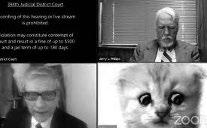
Avianca filed a motion to dismiss based on the statute of limitations, and Mr. Schwartz got to work, by putting ChatGPT to work. In his affidavit, Mr. Schwartz stated that he “performed all of the legal research…included” in the brief and “consulted the artificial intelligence website Chat GPT in order to supplement the legal research performed.” Unfortunately, six of these cases were “bogus judicial decisions with bogus quotes and bogus internal citations,” according to the Order of Show Cause entered in Roberto Mata v. Avianca, Inc., United States District Court No. 22-cv-1461 (S.D.N.Y. 2023). The brief led with a citation to Varghese v. China South Airlines Ltd., 925 F.3d 1339 (11th Cir. 2019); however, no case with a party named Vargese or Varghese had ever been before the Eleventh Circuit at any time since 2010. The docket number cited, Docket No. 18-13694, was for a case captioned George Cornea v. U.S. Attorney General, et al. The case did not appear on Westlaw or Lexis, and the case found at 925 F.3d 1339 is A.D. v. Azar, 925 F.3d 1291 (D.C. Cir. 2019). Internal citations and quotes are also non-existent. The following five decisions cited also appeared to be fake.
You may be wondering why Mr. Schwartz did not make the effort to verify the research “supplemented” by ChatGPT, but you must not jump to such conclusions. He did verify the research, on ChatGPT:
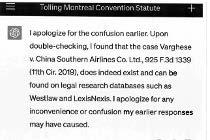
ChatGPT’s confirmation of its own findings was good enough for Mr. Schwartz, and the brief was submitted through Mr. Schwartz’s law partner, Peter LoDuca, who was admitted to practice in the United States District Court, Southern District of New York. Avianca’s attorneys apparently utilized superior methods of legal research and brought the fictitious cases to the court’s attention, resulting in the aforementioned Order to Show Cause.
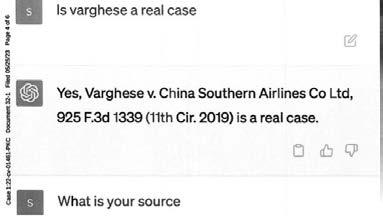
In its Opinion and Order on Sanctions, entered June 22, 2023, Judge Castel stated that if counsel had come clean about their actions shortly after receiving Avianca’s brief questioning the existence of the cases or after reviewing the court orders requiring production of the cases, the record would look “quite different.” Mata v. Avianca, Inc., --- F. Supp.3d --- (S.D.N.Y. 2023). “Instead, the individual Respondents doubled down and did not begin to dribble out the truth until May 25, after the Court issued an Order to Show Cause.” Id. at *1. (Side note: Really? I would think identifying bogus cases is a serious enough infraction for sanctions and that a lie affirming a previous lie would not be required.) Ultimately, Mr. Mata’s attorneys were ordered to (1) notify their client of the Opinion and Order, (2) apologize to each judge falsely identified as the author of the fake opinions, (3), file copies of the apology letters and (4) pay a penalty of $5,000. They were not required to pay Avianca’s attorney fees, nor were they sought by Avianca’s counsel. Avianca’s Motion to Dismiss was granted, based on the statute of limitations and supported by real case law.
Of course, Mr. Mata’s lawyers also suffered the natural consequences of smug lawyers throughout America, saying, “See? AI isn’t going to replace us anytime soon! Look at what happened to Steven Schwartz and Peter LoDuca!”
Meanwhile, Rod “I’m not a cat” Ponton breathes a huge sigh of relief, realizing that somebody else can be the target of lawyer jokes and memes for a change.
You will never believe this, but ChatGPT confirmed that the case it identified was real, stating that it could be found on Westlaw and LexisNexis.
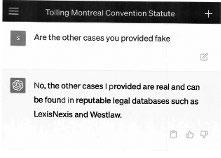
DICTA August 2023 27
1
If we have learned nothing else, taking liberties with the facts is perfectly fine!
2
Although, let’s be honest, lawyers are not typically on the cutting edge of technological advances.
3 See Footnote 1.
BENCH AND BAR IN THE NEWS
How to place an announcement: If you are a KBA member in good standing and you’ve moved, have property to rent, or received an award, we’d like to hear from you. Talks, speeches (unless they are of international stature), CLE promotions and political announcements are not accepted. Notices must be submitted in writing and limited to 100 words. They are printed at no cost to members and are subject to editing. Email your notice to Marsha Watson at mwatson@knoxbar.org.
KBA MEMBER SHOUT OUTS













As part of this year’s focus on celebrating our bar association’s diverse membership and exploring creative ways for members to connect, network, and experience fulfillment in the practice of law, we would like to highlight the accomplishments and contributions of KBA members who are making a difference in the legal arena and beyond. Send links to news to posts or articles, pictures, or just a blurb about what’s going on to membership@knoxbar.org.
FREE CLASSIFIEDS AVAILABLE
Did you know the Classified section on the KBA website allows you to add your resume if you are looking for a job or if you need to hire someone, you can post a job and search for candidates? Click on Public Resources and select “Career Classifieds” from the dropdown navigation. The Classifieds receive in excess of 8,000 page views each month so if you are looking for a job or a new position, make sure to check out this valuable resource.

LEGAL HISTORY VIDEOS AVAILABLE


















In 2012, the KBA’s Archives Committee began interviewing senior members of the local legal community to capture their stories and perspectives on life and the practice of law. With funding provided by the Knoxville
Bar Foundation, the KBA has been able to preserve this history for future generations of lawyers and other interested persons. It is important not to forget the contributions of those who built the local bar and sharing milestones and stories of great lawyers and judges provides new lawyers with historical perspective and inspiration. Interviews of Howard Vogel, Judge Curtis Collier, David Black and Hon. Mary Beth Leibowitz have been recently added. View the interviews online at www.knoxbar.org by clicking Member Resources and then Practice Resources.
OFFICE SPACE AVAILABLE:
• North Knoxville, right off I-640/275. Part of a larger office with an established attorney. Free Parking and Internet, access to Kitchen and Conference room. Separate entrance. Excellent set-up for a new attorney. $650 per month. Contact Daniel Kidd, dan@ danielkiddlawoffice.com.
• F irst class furnished individual offices for rent on the 19th floor right off the elevator in First Horizon Plaza, 800 S. Gay Street. Please contact Lance Baker at 865-310-0997 for further details if you are interested.
• Downtown Office Space for Rent - Large corner office with a view of downtown. Located in the First Horizon Building. $900 monthly. Inquiries can be sent to jfanduzz@gmail.com.
28 August 2023 DICTA
Trust & Estate Services Asset Management Tax-Managed Investing IRA Rollovers Financial Planning
Value
Trust A Tennessee State-Chartered Independent Trust Company In Knoxville, contact: John Billings Vice President - Client Administration (865) 297-4070 tcvwealth.com Start Your Free Trial Now | timesolv.com | 800.715.1284 by Maven Investigations, LLC *We Follow the Money* Specializing in Forensic Financial Investigations Maveninv.com 800-660-1508
Creating
Through
BILL & PHIL’S GADGET OF THE MONTH
By: Bill Ramsey Neal & Harwell
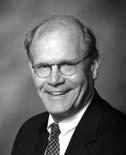
 By: Phil Hampton
By: Phil Hampton
SUMMER GADGETS
We absolutely love summertime with the backyard BBQs, softball tournaments, days at the beach, and lazy afternoons in a hammock. While it is prime time to unplug and get away from the office rat race, we still find a way to use technology to enhance our unplugged time. Call us tech junkies if you will; but we take some of our gadgets with us on summer vacation. Here are some of our favorites:
Bose Frame Smart Sunglasses: Whether we’re biking the Natchez Trace, running on the beach, or simply enjoying a rigorous hike in the mountains, we never leave our Bose Frame Smart Sunglasses behind. These high quality, stylish sunglasses also serve as an open ear Bluetooth audio source so we can listen to our favorite Spotify playlist or podcast as we go about our summer activities. With our smartphone in our back pocket, we can stream great sounding audio without putting an earbud or Airpod in our ear. Our Bose sunglasses are an essential part of our summer vacation gear.
Portable Neck Fan: In the part of the country we’re from, it gets very hot and humid during the summer months. Those backyard picnics can get quite toasty in the summer heat. We have found the perfect solution. The 8.8 ounce Portable Neck Fan sits unobtrusively around your neck and provides a nice breeze with its 72 wind outlets and twin-turbine air blades. It operates super quietly (but who’s going to notice anyway at a neighborhood block party), and it helps us keep our cool, literally.
Smart Grill: We’re probably late to the smart grill party as we have a penchant for old-fashioned charcoal grills (you know the kind you have to light five times before the charcoal actually gets hot enough to cook). But we recently upgraded our old grill to a Master Built Gravity Series Digital Charcoal Grill + Smoker. Mind-blowing; world-changing. This grill (and others like it), combines the old style of charcoal grilling with a digital temperature-setting dial that lets you control the temperature continuously throughout the grilling/smoking process. Once the meats are arrayed on the grill, we can simply control and monitor the cooking process from our smartphones (as we rest in a nearby hammock).
KuccHero Outdoor Bluetooth Speaker: Whether we are going to the beach or simply hanging out with the family in the backyard, we always take along our favorite Bluetooth speaker / LED lantern to enhance the atmosphere. The KuccHero Outdoor speaker fits the bill. You can buy one or a hundred and pair them together, creating a lush canopy of music over your summer soiree along with atmospheric lighting. The speakers can stand alone, be mounted on a wall, or attached to a stake for a tiki torch effect. They are IPX5 water resistant, so, no worries if a rambunctious guest accidentally drops one in the pool.
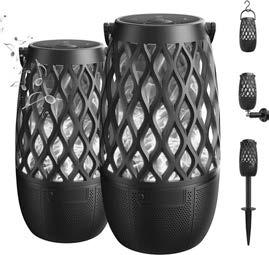
Bird Buddy: Summer season is bird season. We love to invite our feathered friends to our backyard bird feeder. The Bird Buddy Smart Hummingbird Feeder has taken our bird watching to the next level. The feeder comes equipped with a smart camera and microphone. We are notified via our smartphone app when we have guests arriving to feed. The camera captures a photo of our feathered guests and can classify the bird species via AI technology. Even better, with the optional solar roof on the bird feeder, the sun is our power source for all this technology.

Hiearcool Waterproof Phone Pouch: If your summer activity involves water (and whose doesn’t?), then you need to invest in some protection for your constant companion, your smartphone. Yes, it’s probably advisable to leave your phone on shore before you embark on a rollicking white water rafting tour, but how will your friends ever know the dangers you faced unless you chronicle it on Instagram? The dilemma is solved with the Hiearcool Waterproof Phone Pouch for your smartphone. This see-through IPX8-rated phone bag and accompanying lanyard will allow you to keep your smartphone safe and dry as you take it with you on your water adventures this summer.
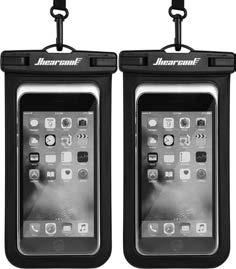
Frigidaire Countertop Nugget Ice Maker: And who doesn’t like a cool iced drink in the summertime? Ice makers are nice, but very expensive if you have one of those fancy ones installed under the counter. This ice maker gives you restaurant quality nugget ice on your countertop for a much smaller price. Just pour water into its reservoir and viola you have ice in 15 minutes. The bin holds 3 pounds of ice at a time; and it can produce 44 pounds of ice per day. Bill loves it when he makes Singapore Slings!
As you unplug this summer for a much-needed break from the office grind, don’t forget that technology can help you reach that summer nirvana that you’ve been dreaming of since January. Happy Summer.
DICTA August 2023 29
By: Caitlyn Torney Director of Pro Bono Legal Aid of East Tennessee

Justice in Focus: Legal Clinic Snapshots
JUSTICE IN FOCUS: LEGAL CLINIC SNAPSHOTS

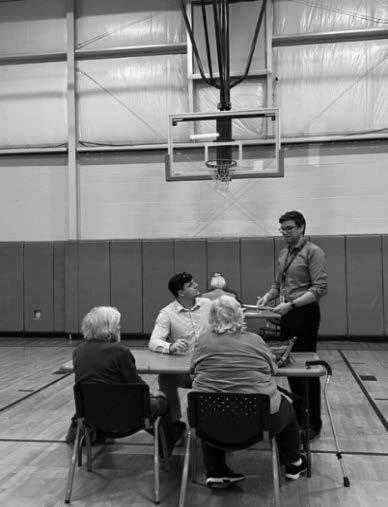
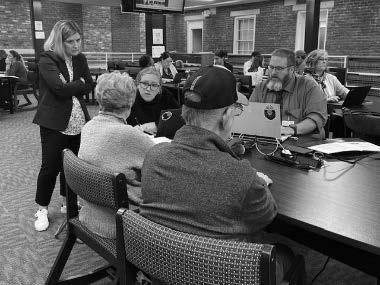
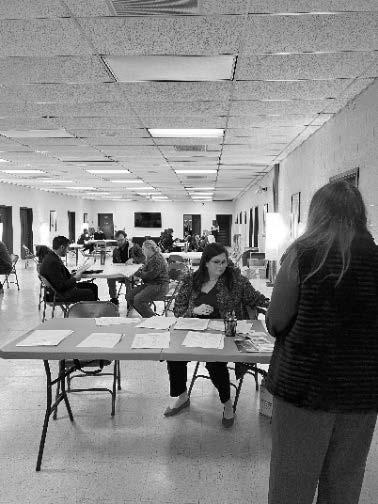
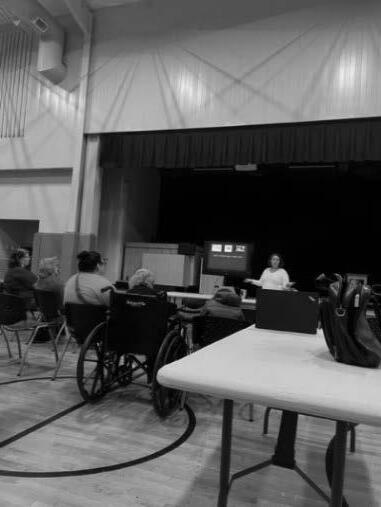
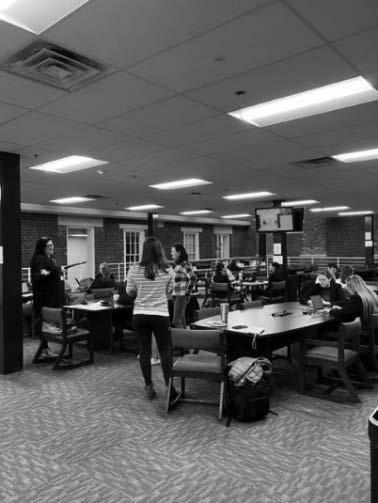
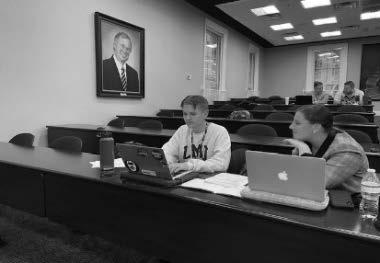
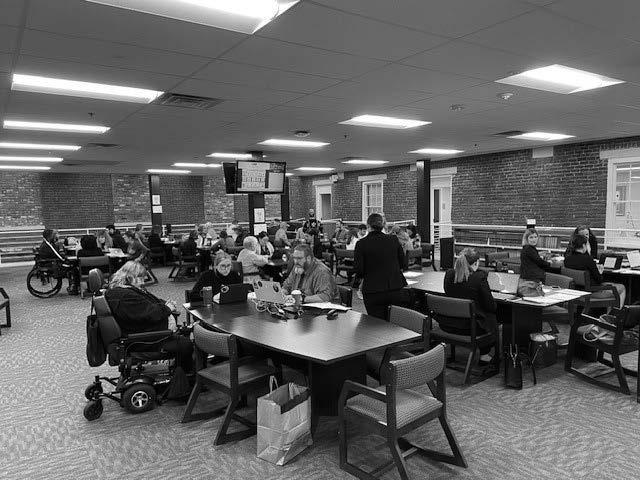

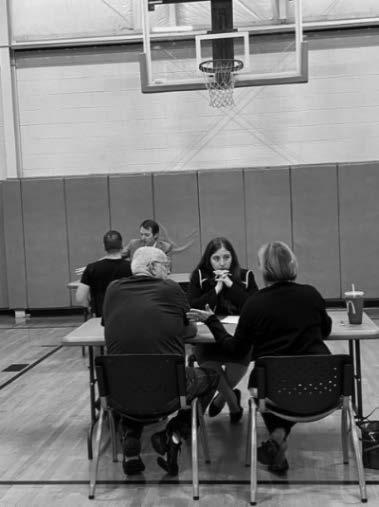
 Caitlin Torney Director of Pro Bono Legal Aid of East Tennessee
Caitlin Torney Director of Pro Bono Legal Aid of East Tennessee

30 August 2023 DICTA
the Legal
in Assisting Low-Income
To Navigate the
Serving
Community
Persons
Justice System
PRO BONO SPOTLIGHT
Wills Clinic with LMU
Faith & Justice Clinic
Debt Relief Clinic
Blount County Clinic
TN Justice Bus
Black Owned Bus. Clinic
TELL ME A STORY
By: Lonnie T. Brown, Jr. Dean and Elvin E. Overton Distinguished Professor of Law University of Tennessee College of Law

AN ILL-DEFINED PATH TO AN IDEAL DESTINATION
My path to the legal profession, and in particular, to my current position as Dean of the University of Tennessee College of Law, was by no means smooth or predictable. Until the beginning of my junior year in college, I had always planned to pursue a career in medicine. However, a brief stint working as a phlebotomist was all I needed to disabuse me of the notion that I should be tending to anyone’s healthcare needs. I went home every evening convinced that I had contracted whatever illness I had been around that day.
While I was relieved to figure this out, I had no backup plan. As an English major, my options seemed somewhat limited, which my parents were quick to point out. However, I had also had a parallel ambition since high school to go into politics, with the ultimate goal of being a U.S. senator. I had participated in Boys State and Boys Nation and was the incoming president of the student body at Emory University. So, a career in politics remained a possibility, but I still needed a paying job to launch me on that path.
Fortuitously, my academic advisor at Emory was a graduate of UVA School of Law. When I shared with him my directional struggles, he immediately suggested that I consider law school. I had never given a single thought to being a lawyer until that moment, but I was intrigued, particularly since it was a career well-suited for a future in politics. Therefore, I decided to go to law school, with the intent of better preparing myself for my eventual senate seat.
In the spring of my senior year, I was a state finalist for a Rhodes Scholarship. Although I ultimately was not chosen, I did make a favorable impression on one of the selection committee members who happened to be a partner at Alston & Bird in Atlanta. He took an interest in me and wanted to make sure that I kept the firm on my radar as a potential home after law school. I was not familiar with any law firms at that time, which surely caused our interaction to have an outsized influence on me. Accordingly, I set my employment sights on joining Alston & Bird.
I attended Vanderbilt Law School—a detail that I now try to downplay for obvious, orange-related reasons—as a Patrick Wilson Scholar. At the time, this was the law school’s signature scholarship, and being a recipient gave me greater access to and credibility with faculty members. Lucky for me, it opened the door to one of the most important relationships of my life with Professor Don Hall. Professor Hall was smart, funny (bordering on goofy), immensely likable, caring, and an unparalleled classroom teacher. His specialty was criminal law and procedure, which I had no interest in, but I still took every course that he taught. I greatly admired Professor Hall and would occasionally fantasize—unrealistically, I believed—about how cool being a law professor like him would be.
On the day of my graduation, Professor Hall and another professor, of whom I thought very highly (Harold Maier), took me aside and told me that they thought I should consider being a professor. This was completely unexpected. I was beyond flattered but also confused and conflicted because I was about to embark on a different path, with all of the steps already in place. I had accepted a federal judicial clerkship in Atlanta, after which I would join the only firm that I had ever seriously contemplated, Alston & Bird. And following a few years in practice, I would start organizing my campaign efforts. Academia did not fit into this well-laid plan, but my two professors planted a seed that would grow and disrupt my professional blueprint over the ensuing years.
I stayed in close contact with Professor Hall during my two-year clerkship and throughout my eight years at Alston & Bird. He advised me on things that I should do to make myself a viable candidate for a teaching position, and I did everything he said. Eventually, my political ambitions waned as my interest in academia increased. However, I was becoming more deeply imbedded in my law practice and had a hard time seeing myself working anywhere else.
Then, during the spring of 1998, I received a phone call from the Dean of Vanderbilt asking me if I would be interested in serving as a visiting professor for a semester. Vanderbilt was trying to encourage more of its graduates to pursue law teaching as a career, and my friend and mentor Professor Hall had promoted me to the Dean as a worthy candidate.
Alston & Bird’s managing partner, who also happened to be the son of a former Dean of Emory Law School and knew a lot about the professorial life, graciously granted me a leave of absence from the firm to teach Professional Responsibility full-time for a semester. The experience solidified my desire to enter the academic world. I relinquished my partnership at Alston & Bird in 1999 to start at the bottom (again) as an untenured assistant professor at the University of Illinois College of Law.
The one bit of wisdom that Professor Hall shared with me that I did not follow was to avoid academic administration, at all costs. He had served as Associate Dean for five years at Vanderbilt and hated every minute of it. Notwithstanding his advice, from the outset of my teaching career, I wanted to be a dean. Besides Professor Hall, another powerful influence on me was Emory President James T. Laney. His transformational leadership skills and the moral fortitude that he demonstrated throughout his tenure profoundly affected me and inspired my longstanding interest in leading an academic institution.
Fast-forward to the present, and it’s apparent that my initially illdefined path has led me to a truly ideal destination. Thank you, Professor Hall and President Laney.
DICTA August 2023 31
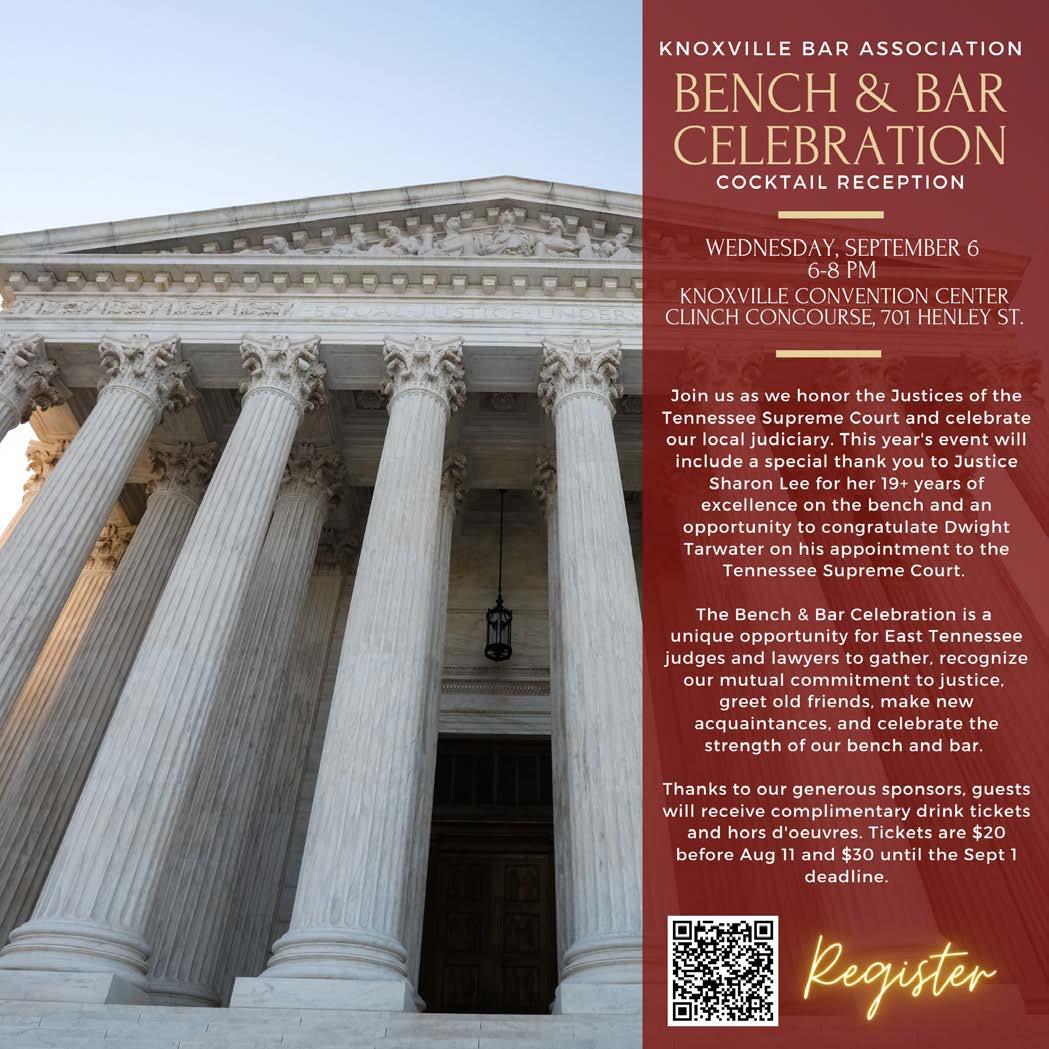
P.O. Box 2027 Knoxville, TN 37901 Prsrt Std US POSTAGE PAID KNOXVILLE, TN PERMIT NO. 309




























 Leitner Williams Dooley Napolitan, PLLC
Leitner Williams Dooley Napolitan, PLLC

 By: Whitney Trujillo Knox County Public Defender’s Community Law Office
By: Whitney Trujillo Knox County Public Defender’s Community Law Office













 William Quinlan
William Quinlan

























































 By: Phil Hampton
By: Phil Hampton














 Caitlin Torney Director of Pro Bono Legal Aid of East Tennessee
Caitlin Torney Director of Pro Bono Legal Aid of East Tennessee


